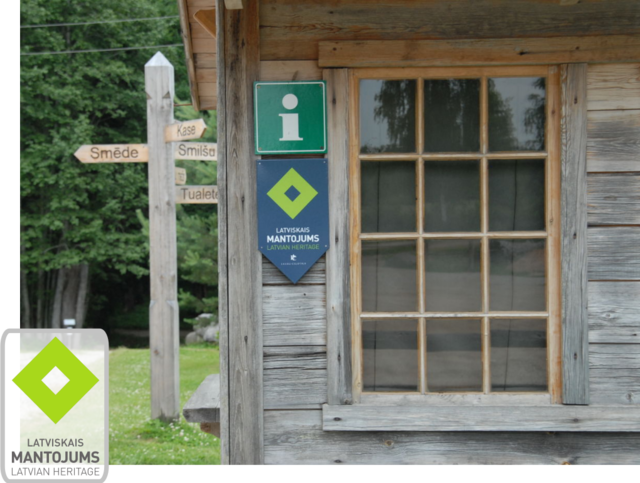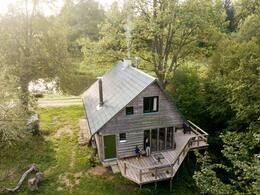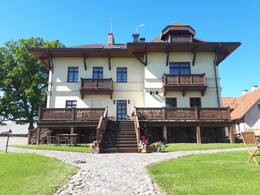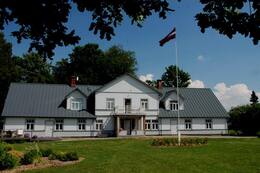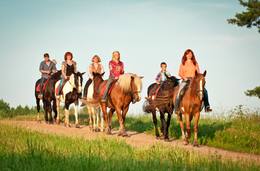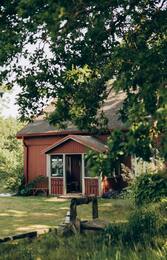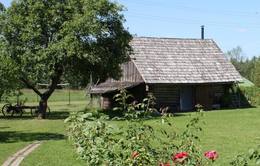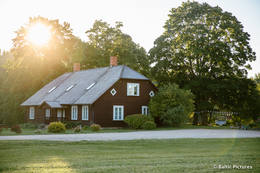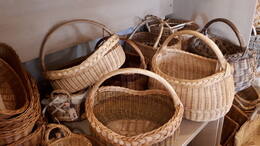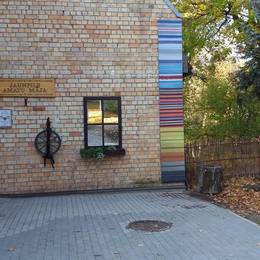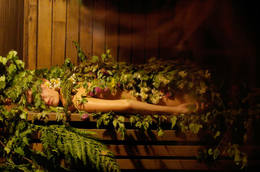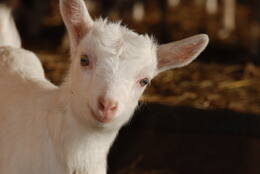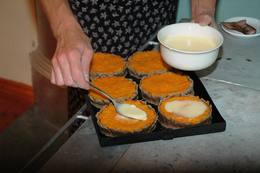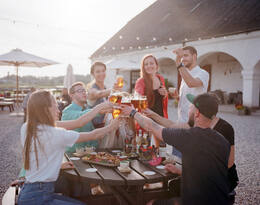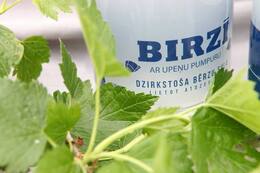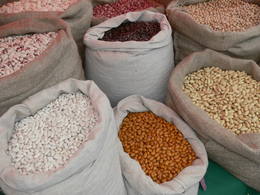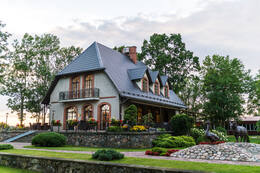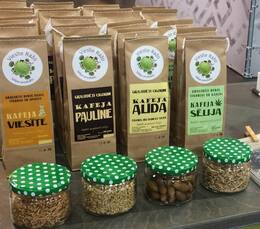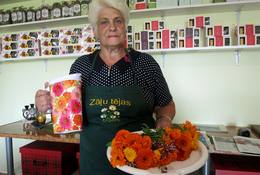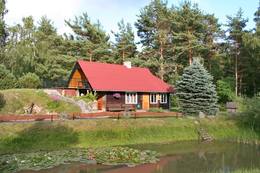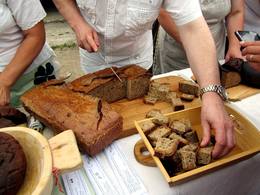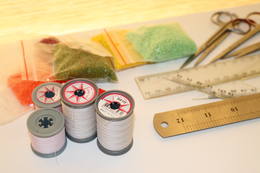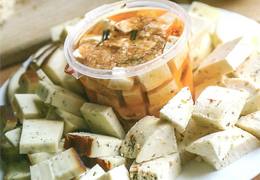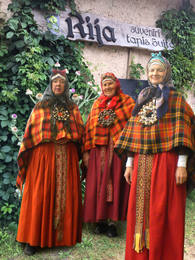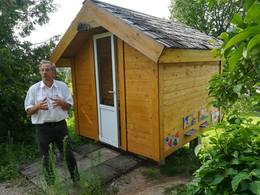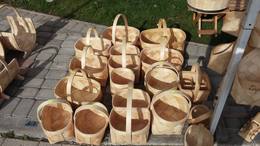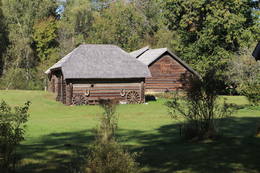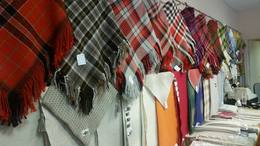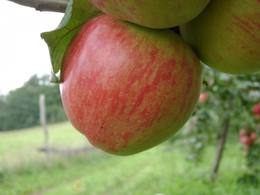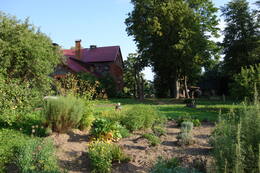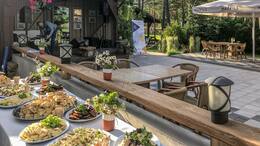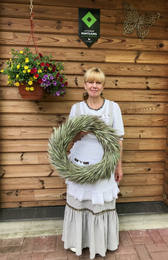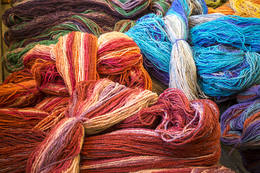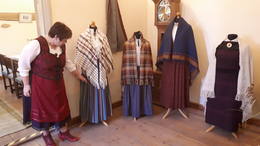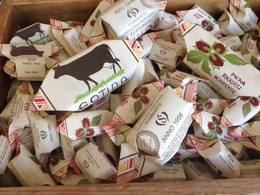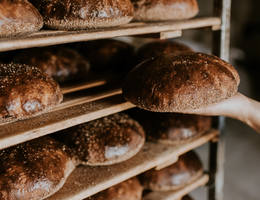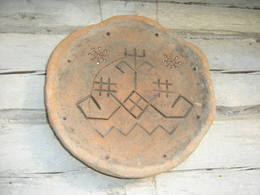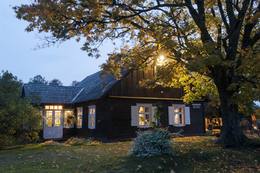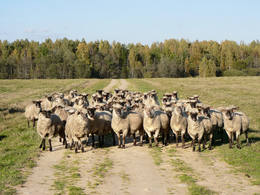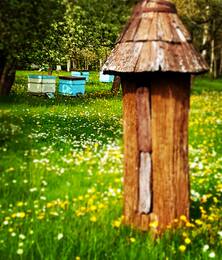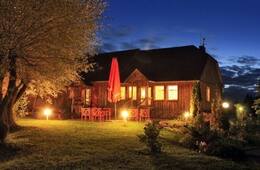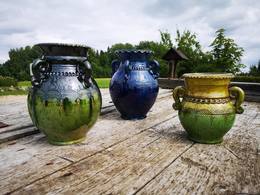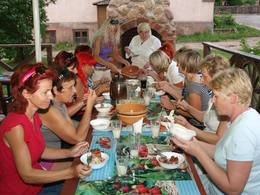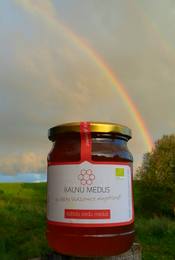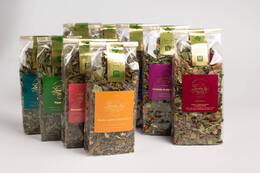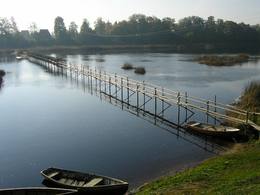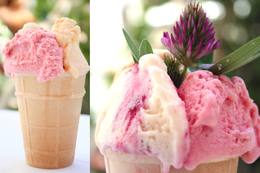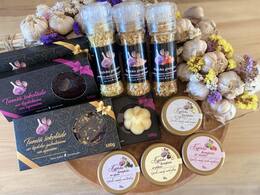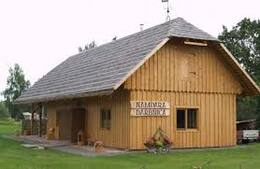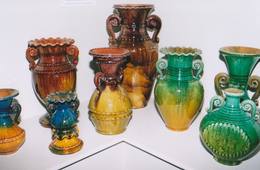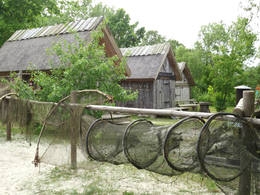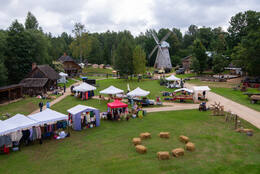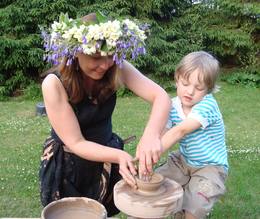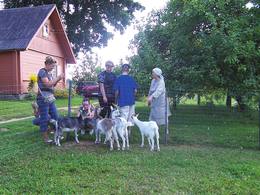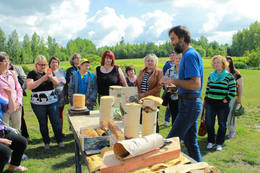Culture mark "Latvian heritage"
The Sign of Latvian Heritage was established at the initiative of Baltic country holidays, and it is presented to tourism-related entrepreneurs who preserve and promote Latvian cultural and lifestyle heritage by presenting it to visitors. The sign indicates locations at which owners are prepared to show things, tell stories, offer Latvian foods, teach crafts and skills, and celebrate Latvian holidays. The sign of Latvian heritage is received by owners of accommodations, farms, crafts workshops and rural saloons, organisers of events related to Latvian traditions, museums, owners of collections, and specialists in the areas of crafts.
This database is prepared in the framework of the project "Heritage Tourism", which is part-financed by Central Baltic INTERREG IV A Programme 2007-2013.
The content of the publication reflects the authors views and the Managing Authority cannot be held liable for the information published by the project partners.

| Overview | Details |
|---|---|
|
Latvia
DieninasA small fishermen’s house preserved in the original style, situated not far from the sea in Berzciems, offers 2 comfortable rooms for peaceful rest, with a fireplace and a small kitchen. The family of the owners through many generations try to preserve old fishermen’s traditions, including those in fish processing and smoke curing. The guests have an opportunity to buy local products – smoked fish from the Engure lake and the Baltic Sea. The owners of the Dieniņas homestead have preserved old traditions related to fishing and fish processing, and they have engaged in this work for three generations now. Fish are processed in line with ancient and local recipes, making use of technologies that are typical of the coastline. Visitors can buy local smoked fish. Tourist groups are invited to take part in an active leisure and cultural event, complete with dishes of fish that will fill their stomachs, a boot-tossing event at the sea, stories by the wives of the fishermen, a theatrical performance, smoking of fish, and tasting of fish.
Preservation of coastline fishing traditions |
|
|
Latvia
from 50 EUR / night
PIEKUNIRelaxation at the foot of Gaiziņkalns hill. Sauna with fireplace, beds produced in the manner of 12th-century artisans. Sauna specialist available. Wandering through the forest with a guide. Par latvisko pirts tradīciju uzturēšanu un daudzināšanu. “Piekūni” meklējami Gaiziņkalna pievārtē. Saimnieki piedāvā latviskos pirts rituālus, kur pēršanās procesu pavada dziesmas un zāļu tējas. Saimniece Anita ir arī vietējais gids, kura stāsta par Gaiziņkalna apkaimi, šejienes dabu un tradīcijām. |
|
|
Latvia
Mazmezotnes muizaThe first written information about the estate dates back to the 3rd quarter of the 18th century. It is known that in 1769, the estate had 14 buildings. Charlotte Lieven received Mežotne as a gift from Russian Empress Catherine the Great in 1759. The estate suffered much damage during World War I. After the war it became an exemplary estate, but its roof and mansard burned down during World War II. Restoration of the estate began in 2007. Today Mazmežotne Estate is a beautiful place, surrounded by nature. It offers recreational facilities, including accommodations, dining, banquet facilities for events and seminars, as well as biking, boating and hiking for those who enjoy exercise. The former stables and barn offer spacious halls for celebrations, weddings, seminars, concerts, exhibitions. One of the buildings houses a SPA complex with a range of relaxing procedures. The open chimney house offers an exhibition of the history of sugar-beet cultivation and sugar production industry in Latvia. The old cheese house is now a sauna with a relaxation room, a hot water tub outdoors, and a terrace. Par cukurbiešu audzēšanas un pārstrādes tradīcijas izzināšanu un daudzināšanu. Atjaunotajā “Mazmežotnes muižā” ir senas cukurbiešu audzēšanas tradīcijas jau no grāfa Līvena laikiem, kas turpinātas arī pēc Latvijas neatkarības atjaunošanas. Īpašnieki vienā no muižas ēkām ir iekārtojuši modernu un interaktīvu ekspozīciju, kas stāsta un rāda cukurbiešu audzēšanas vēsturi Latvijā. Ekspozīcija pieejama ikvienam interesentam. |
|
|
Latvia
CaunitesThis Latvian tradition farmstead, located 12 km from Jelgava, offers to learn about ancient bread baking traditions, Latvian annual festivals, and various types of handicrafts, such as weaving and making puzuri decorations and beeswax candles. The house is designed and decorated in the traditional Latvian style and exudes an authentic ambience while having modern facilities. The heart of the farmstead is a barn with a bread baking stove. The hosts bake rye sourdough bread from “Dobeles dzirnavnieks” flour and the traditional salinātā rye bread from “Grauda spēks” flour. Salinātā rye bread is registered in the EU food quality scheme as a product with traditional speciality guaranteed. The hosts offer to enjoy various traditional seasonal activities. Please arrange your visit in advance.
LATVIAN HERITAGE CULTURAL MARK IS AWARDED FOR: For popularisation and fostering of Latvian traditions. |
|
|
Latvia
MekeHotel MEKE was opened in 2016. It was established in the premises of Dunte School, built in 1867. The old wooden building has 8 well-equipped guest rooms with preserved historical elements, recreation and seminar rooms. There is a small ballroom 30 m2, a large ballroom 60 m2. Hotel Meke is located 3 km from the rocky seashore of Vidzeme. Bicycle rental is available at the hotel. Nearby is the Mecca Pub, where you can have a delicious meal. For modern solutions to the introduction and conservation of Latvian environment and historical buildingsThe architecture style of late 19th and early 20th centuries was preserved during the restoration of Meke hotel and appropriate interior was designed. The lobby features photos with the historical evidence of the building. The owners will tell the history of the building and the surroundings to the visitors, and offer social leisure events. |
|
|
Latvia
from 60 EUR / night
Horse farm KLAJUMIKlajumi is situated among picturesque surroundings of Daugavas Loki Nature park and offers accommodation in 3 cottages. Guests can enjoy horse riding facilities. The property is located 2 km from Kaplava village and 5 km from the Latvian – Belarusian border. The town of Krāslava is 10 km away. "Klajumi" holiday house. On the first floor of the holiday house there is a kitchen with fireplace, dishes and other tools necessary for cooking and eating, herbal tea and instant coffee, a fridge, radio and CD player, shower and sauna. On the second floor and in the attic there are bedrooms. Next to the cottage there is a dry toilet. "Klajumu Ķemeri" holiday house. Wooden log house with a kitchen, a bedroom, WC and shower. "Klajumu Ganiņi" holiday house. Two rooms, a kitchen, a bathroom. House is suitable for people with disabilities. The horse farm features friendly and purebred horses from Latvia, Lithuania and Belarus (12 in all), as well as three different kinds of cosy dogs, rabbits, chickens, cows and cats. This is a true countryside environment involving four different homesteads – Klajumi, Ganiņi, Ķemeri and Krasti. Visitors can go horseback riding to visit the Rings of Daugava Nature Park and the frontier between Latvia and Belarus. Please be aware that personal identification is needed when entering the frontier zone. |
|
|
Latvia
LUKIFarmstead "Lūķi" is a place in Jūrkalne, where you can be at peace and quiet in nature. You can relax in the cottages in the garden or in the big house. Each place is designed to make guests feel comfortable and undisturbed. The farm has a landscaped landscape with large oaks, a tea garden, an authentic sauna and garden sheds. There is also a salon with ancient and modern handicrafts. The farm is suitable for a quiet rest or family celebration. LATVIAN HERITAGE CULTURAL MARK IS AWARDED FOR: For preserving the traditional rural environment. |
|
|
Latvia
DZIRNUPESA traditional Vidzeme country farm 15 km from Limbaži town, where guests have the opportunity to spend the night in a romantic barn. The granary built in 1924 has turned into a granary for receiving guests. There is also a sauna in the barn building, a pond and a river on the territory for fishing or a romantic boat ride, and an outdoor shed. On Latvian view on lifeA traditional farmstead of Vidzeme situated 15 km from Limbazi, is a place where guests have the opportunity to stay overnight in a romantic barn. The granary built in 1924 has turned into a barn for welcoming guests. „Dzirnupes” is a good place to relax for a couple or together with children. There is a sauna in the barn as well. There is a pond and a river suitable for swimming and fishing or romantic trip with a boat, arbour, a little house of forge, where the host will show you how to forge a nail; swings, a small allotment with the local vegetables and plants as well as flourishing meadows. One can even visit animals which are allowed to see, feed and stroke. The owners follow a Latvian way of living, which they have passed on to their children. The host makes different tools for work on the field on his own as well musical instruments. At present the hostess is working at a new touring offer - “Studies for wives” or “Sievzinibas” ,a programme appropriate in reference to Latvian traditions which offer the possibility for women who have recently got married to acquire different Latvian traditions and skills, int.al., baking bread. |
|
|
Latvia
LANTUSA newly renovated Vidzeme farm for those who love comfort. Several halls with fireplaces, a sauna, a pool, catering service, a pond and the forest. A country house in a landscaped setting by a pond and near forest. A wooden bathtub with a wood stove outdoors! Latvian Heritage cultural mark is awarded for Latvian traditional ambienceIs a renovated country estate of Vidzeme for comfort loving guests. Various fireplace halls, sauna, a pool, Jacuzzi, catering, sports ground, a pond, forest, a wooden tub with wood-burning stove under the open sky. The hostess prepares Latvian country dishes by using local products or products cultivated on their own. |
|
|
Latvia
Petera Tutana pineju darbnicaPēteris Tutāns runs a wickerwork workshop, “Kalndaķi,” in a lovely location near Milzukalns hill. The workshop dates back to the mid-1980s as a family operation. In 1999, the family turned the workshop into a true business, “Pinumu Pasaule,” which today is one of the largest wickerwork companies in Latvia. The company is run by wife Lolita, while Pēteris works at his creative workshop, “Kalndaķi.” Raw materials for the wickerwork include debarked or not debarked osier wicker from trees which grow on the farm. The whole process from growing the wicker and finishing the product is handled by hand. Pēteris weaves baskets, kitchen utensils, interior design objects, garden furnishings, toys for children and various souvenirs. Visit the workshop and see how the wicker is grown. Purchase finished products or take part in a wickerwork master class. Overnight accommodations are available. For the promotion of the craft of a weaverCraftsman Pēteris Tutāns manages Pinumu Pasaule (World of Plaiting), which is one of the largest plaiting companies of Latvia. All stages from the growing of willow to the end product is made by hand. The company prepares plaited baskets, kitchenware and interior objects, garden furniture, etc. The visitors can view the workshop, learn about growing willows and purchase finished products. |
|
|
Latvia
The Juri farmThe owners of the farm inherited it. There is a wood house with decorative trim and window shutters. The owners use milk from their own cows to produce cheeses on the basis of old and modern recipes. You can taste the cheese, milk, clotted milk, buttermilk and other dairy products, watch how they are made, and take part in the process yourself. There are also animals to view. The owners live on a farm that they inherited from their ancestors, and they use cow milk from the farm to produce cheese in accordance with old and new recipes. Visitors can taste milk, soured milk, buttermilk and other dairy products, watching how they are produced and taking part in the process. There are farm animals to visit, as well.
SIGN AWARDED FOR: Latvia foods, Lettigalian foods, cheese-making |
|
|
Latvia
RIDELI MILLThis water mill dates back to the 1920s and was restored in 1992. You can view the historical mechanisms and learn about the grinding process. The Cope Cafeteria offers pancakes made of the locally ground flour and filled with mushrooms, cheese, vegetables, meat, honey, sweet cream, cottage cheese, ice cream or caramel. For the preservation of the material heritage of the mill and promotion of the skills of the craftRideļi mill has been reborn in new quality. The mill that was built in the 20s of the 20th century now hosts a modern exposition of historical milling mechanisms and devices, as well as household and other objects used at the farm. Detailed descriptions, technical drawings and pictures of the devices have been developed. The visitors can access all floors of the mill either themselves or accompanied by a guide. |
|
|
Latvia
Ludza Craftsmen CentreHere you can examine and purchase crafts by more than 40 Lettigalian craftspeople. A guide dressed in an Ancient Lettigalian folk costume will tell you about the lives of ancient Baltic tribes, the emergence of craftsmanship in the region, ancient laws related to ethics and work, and traditions. There are demonstrations of the crafts and lessons about the ancient skills. Groups can enjoy a luncheon of Lettigalian dishes, and learn how to bake bread and prepare beverages in an old-fashioned Lettigalian kitchen. The local craftsmen's salon and home producer's store Cymuss and Latgaļu kukņa, a member of the Latgale culinary heritage network. For groups, Latgaļu kukņa offers lunches and a special skills school for learning to prepare Latgalian food, bread and drinks. Latvian cuisine: Grey peas, dumplings in cream sauce, Lettigalian pastries and moonshine alcohol. On praising Latvian skilled trade. On Latvian dishes. On preserving Latvian traditionsHere one can see and choose to buy something from more than 40 works of Latgalian craftsmen. It is offered to enjoy a narration of a guide dressed in a costume of ancient Latgalians in the room Suprādku about the life of tribes of ancient Balts, the origin and history development of crafts, as well as the laws of ancient ethics and work, traditions. It is also possible to see demonstrations of particular trades and acquire the mastering of ancient skills. The visitor groups can have lunch and try out Latgalian dishes as well as enjoy the preparing of bread and drinks of Latgalian cuisine. |
|
|
Latvia
The Klajumi horse farmThe farm features twelve friendly horses from Latvia, Lithuania and Belarus, as well as three eager dogs of various species, along with rabbits, chickens, cows and cats. Here you will feel the true country spirit in four adjoining farms – Klajumi, Ganiņi, Ķemeri and Krasti. The location is near the “Rings of the Daugava” Nature Park, and you can go horseback riding along the border between Latvia and Belarus. Latvian cuisine: Schnitzel of mushrooms, potato dumplings with dried mushrooms or meat, cream sauce and onions, baked chanterelles with new potatoes, sautéed vegetables and mushrooms, strawberries with ice cream, moonshine liquor. Special foods: Cranberry fool a la Klajumi SIGN AWARDED FOR: Latvian landscape, Latvian breeds of horses The horse farm features friendly and purebred horses from Latvia, Lithuania and Belarus (12 in all), as well as three different kinds of cosy dogs, rabbits, chickens, cows and cats. This is a true countryside environment involving four different homesteads – Klajumi, Ganiņi, Ķemeri and Krasti. Visitors can go horseback riding to visit the Rings of Daugava Nature Park and the frontier between Latvia and Belarus. Please be aware that personal identification is needed when entering the frontier zone. |
|
|
Latvia
Jaunpils Handicraft HouseThe Jaunpils Crafts House opened on May 10, 2015, and it is home to a group of weavers from Jaunpils that was established in 1970, as well as the “Dzīpars” organisation. The group is led by a master weaver, Velga Pavlovska, who is happy to share her knowledge with the 18 women who are part of the group. She organises the work of women who do handicrafts, and she also conducts tours and creative workshops. Visitors can learn about the work of weavers and other master handicraft specialists, take part in educational master classes, go on tours and purchase various souvenirs. For the promotion of craftsmen’s skillsThe crafts house of Jaunpils hosts Jaunpils Weaver’s Group, which was founded in 1970 and is currently headed by weaving craft master Velga Pavlovska. The weavers use ancient looms and traditional techniques to weave traditional patterns. Visitors may join informative excursions, get involved in creative workshops, try their hand in weaving skills and buy souvenirs. |
|
|
Latvia
Hemp farm ADZELVIESIThe farm produces hemp from which it produces hemp butter, roughly ground seeds, as well as hemp oil. The granary, which is 101 years old, features antique instruments once used to process hemp fibres. Visitors can taste and purchase delicious products and take an exciting tour which speaks to the history of hemp farming. Latvian cuisine: Rough and fine hemp spread, hemp sandwiches, pressed and toasted hemp crumbs, hemp oil.
On Latvian skilled trade – hemp fatsIn the fields of „Adzelviesi” hemp is cultivated, from the seeds of which hemp butter and rough grinding is produced. Ancient instruments of processing hemp fibres are exhibited at the barn (year 101). Here one can taste and buy tasty production as well as enjoy a short and exciting journey along the history of hemp cultivation. Hemp is an ancient Latvian cultivated plant, which has been cultivated more than 1000 years. |
|
|
Latvia
UpeniteThe “Upenite” country house is located on the southern shore of Lake Ciritis. This farm nurtures Lettigalian traditions, serves Lettigalian foods, produces dairy products (including cheeses), grows local plants (which you can purchase), and offers a chance to visit a proper Lettigalian black sauna. The owners themselves will serve as the sauna masters. Master’s classes in the baking of tortes are offered. For the promotion of traditional Latgalian foodThe owner Inese Survilo offers Latgalian meals that are prepared according to the recipes of forefathers. The landlady shows and tells – how to make cheese – a skill she has learned from her grandmother. The visitors may participate in the process and taste cheese with various additives. She prepares krupņiks ar gulbim (barley porridge with potatoes), gulbešnīki (potato pancakes) and farm cakes, furthermore, cooking skills of these dishes can be acquired at organised master classes. |
|
|
Latvia
Pub MEKEOpened on June 21, 2011, at the 51st kilometre of the Tallinn-Riga highway, the MEKE KROGS pub is a typical example of the roadside pubs which used to be built along the sides of roads and near homesteads, castles, mills and windmills. This particular one is located into renovated cattle shed that is more than 100 years old – a lovely log building that is named after the former baron of the local estate, von Mecke. Alongside it is the handsome parish building which was erected in 1907 with red bricks from Tūja. Latvian cuisine: Sorrel stew with grits, cold soup, pounded beef, mutton and vegetable stew, grits with smoked meat and mushrooms, herring with cottage cheese, bread soup. Special foods: Porridge with bacon bits and Meke spicy sausages. On Latvian dishes On Latvian sceneryAn authentic pub established in a 105 years old byre. Its menu offers such particular drinks and dishes prepared in the earlier times as groats porridge, sorrel soup, thick pumpkin soup, grey peas, bacon rolls, and homemade moonshine. |
|
|
Latvia
The Latgale beer farm "Kolnasata"The slogan for this farm is “Here we produce real Latgale beer!” You can help to brew beer, listen to stories about traditions, and taste the finished products. The owner also offers country goodies as snacks – ones which are based on Lettigalian traditions. The slogan for this operation is: “Real Latgale beer is produced here!” Visitors can help in brewing beer, hear stories about traditions, and taste the finished product. The owner also offers Lettigalian goodies for some noshing.
SIGN AWARDED FOR: Latvian beverages (beer) |
|
|
Latvia
The Vaidelotes farmThis is a farm which popularises Latvian lives, organises traditional rituals, and provides guests with tasty country foods such as porridge, dumplings, pierogi and pastries made of grain and roughly ground flour that are produced at the farm itself. You can purchase teas, herbs and country goodies. Latvian cuisine: Soups, porridges, desserts, pierogi, sheet cakes and country tortes. Special foods: Dumplings made of roughly ground whole wheat flour with cottage cheese and bacon. On preserving Latvian traditions. On Latvian dishesThey popularize Latvian way of living, practice ancient rituals, treat with dishes of culinary heritage – porridge, bacon rolls, dumplings, pan bread, which have been made from grains cultivated of their own as well as rough grinding flour. Purchasing of tea, spices and country products. Annual celebration festivities are organized where traditions are demonstrated with the help of playing music, singing, dancing and practicing different rituals. The hostess manage the events and explain traditions. Corresponding dishes to the particular celebration are being made. |
|
|
Latvia
Leather products and horse tackle at ApkalnmajasHere you will find everything needed for horseback riding, including reins, belts, leather sacks, etc. You can tour the exhibition hall, learn about types of leather, try your hand at the process, and purchase products. The craftswoman will be delighted to talk about the Lettigalian lifestyle. The crafts workshop at the Apkalnmājas farm was established on the basic of typical countryside crafts traditions and the typical lifestyle of the Latgale region. The workshop has been successful in producing horse tack, belts, leather sacks, etc. Visitors are offered a tour of the exhibition and workshop, learning about types of leather and the secrets of leatherwork. They can also try their own hand at producing leather goods and purchase finished products. Master’s classes and lessons are available. The owner will also discuss her experience with the Lettigalian lifestyle.
Preservation of traditional crafts – horse items |
|
|
Latvia
Piekuni – sauna rituals and the Latvian way of lifePiekūni offers Latvian sauna rituals merged with folk songs and herbal teas. You can then sleep in a bed made of round wood and designed in accordance with ancient Latvian style. The owners will offer you a tour to tell you all about how our ancestors dealt with the environment – plants, rocks, sources of energy, etc. Par latvisko pirts tradīciju uzturēšanu un daudzināšanu. Saimnieki piedāvā latviskos pirts rituālus, kur pēršanās procesu pavada dziesmas un zāļu tējas. Saimniece Anita ir arī vietējais gids, kura stāsta par Gaiziņkalna apkaimi, šejienes dabu un tradīcijām. |
|
|
Latvia
Leisure centre "Sauleskalns"Recreation complex "Sauleskalns" is located on the outskirts of Riga, in Zaķumuiža, Ropaži region. The guest house offers accommodation and saunas, as well as active leisure activities for children and adults, such as boat rental, sports fields, a laser tag, 4x4 trips and a canapolo. The complex also accommodates student excursion groups, as it has a cognitive and walking trail "Sun Trail", where you can get to know all 8 Latvian anniversaries. Thematic culinary programs, events, master classes and tastings are organized in the "Craft House". There are also creative workshops where you can make masks, candles, bird cages, etc. things. One of them is the Bread Workshop, where it is possible to learn rye bread baking skills. Workshop visitors also receive a recipe for yeast and rye bread. For maintaining and chanting Latvian traditions. The hosts nurture Latvian traditions and share their knowledge with visitors, a significant part of whom are students. There is a "Sun Trail" in Sauleskalns, which introduces eight Latvian anniversaries, where you can participate in creative workshops, make masks, attend culinary master classes and tastings. |
|
|
Latvia
DzirnupesThis is an organic farm, and visitors are invited to join in the fieldwork - gather hay, make sauerkraut, pull weeds, milk a goat, watch the geese, catch some fish and then smoke them in accordance with the farmer’s own recipe. Visitors can also help to bake bread. There’s a sauna where you can inhale the aroma of healthy grasses and drink some medicinal teas.
On Latvian view on lifeA traditional farmstead of Vidzeme situated 15 km from Limbazi, is a place where guests have the opportunity to stay overnight in a romantic barn. The granary built in 1924 has turned into a barn for welcoming guests. „Dzirnupes” is a good place to relax for a couple or together with children. There is a sauna in the barn as well. There is a pond and a river suitable for swimming and fishing or romantic trip with a boat, arbour, a little house of forge, where the host will show you how to forge a nail; swings, a small allotment with the local vegetables and plants as well as flourishing meadows. One can even visit animals which are allowed to see, feed and stroke. The owners follow a Latvian way of living, which they have passed on to their children. The host makes different tools for work on the field on his own as well musical instruments. At present the hostess is working at a new touring offer - “Studies for wives” or “Sievzinibas” ,a programme appropriate in reference to Latvian traditions which offer the possibility for women who have recently got married to acquire different Latvian traditions and skills, int.al., baking bread. |
|
|
Latvia
LicisiThis is one of Latvia’s first and largest goat farms in Latvia. The owner will offer you an attractive tour, with information about breeding goats and producing dairy products (milk, cheese kefir) – products which you can taste and purchase. This is one of Latvia’s earliest and largest got farms. Tourists will hear attractive stories about how goats are bred and goat milk products (milk, cheese, kefir) are produced. The products can be tasted and bought. The local Latvian breed of goats has existed since the turn of the 19th century.
SIGN AWARDED FOR: Goat milk products |
|
|
Latvia
House of traditions "Zvanitaji" in RucavaThe wooden building was erected in the late 19th century and features a museum which demonstrates the way in which people lived more than 100 years ago. Exhibits include household objects, the Rucava folk costume, socks and decorated mittens. Various events involving discussions, singing, games, dancing and weaving are organised, as are cultural and educational programmes such as “Evening Activities” and “A Rucava Banquet” with local foods from lower Kurzeme. Latvian cuisine: Buns, sourdough porridge, homemade bread, honey, herbal teas. The Zvanītāji Centre of Traditions is located in the heart of Rucava. It is housed in a late 19th century wooden building that has been turned into a museum which features the lifestyles of people more than 100 years ago. Antique household objects are on display, as are folk costumes, stockings and mittens that are typical of Rucava. The centre organises various events related to visiting, singing, playing and dancing, and it weaves useful textiles. There are cultural and educational programmes such as “Evening Sessions” and “Celebratory Feasts in Rucava.” Guests can sing, dance and play music together with Rucava story-tellers, singers and musicians, also enjoying traditional foods such as rye bread, white butter with potatoes, potato pancakes, potato buns and carrot buns.
SIGN AWARDED FOR: Latvian traditions, Latvian foods, a Latvian building |
|
|
Latvia
Fisherman's farm DIENINASThe owners are third-generation fishers, and they will be happy to sell you some smoked local fish. Tour groups can take part in active leisure related to cultural aspects of smoking tasty fish (tossing a boot into the sea, stories from fishermen’s wives, a theatrical performance, and the smoking and tasting of fish). Latvian cuisine: Smoked and dried plaice, hot-smoked eelpout and other fish prepared on the basis of ancient local recipes. The owners of the Dieniņas homestead have preserved old traditions related to fishing and fish processing, and they have engaged in this work for three generations now. Fish are processed in line with ancient and local recipes, making use of technologies that are typical of the coastline. Visitors can buy local smoked fish. Tourist groups are invited to take part in an active leisure and cultural event, complete with dishes of fish that will fill their stomachs, a boot-tossing event at the sea, stories by the wives of the fishermen, a theatrical performance, smoking of fish, and tasting of fish.
Preservation of coastline fishing traditions |
|
|
Latvia
Baking carrot buns "Usi"The farm is located in the north-west of Latvia, which was historically inhabited by Livonians and, nowadays, is often called the Livonian coast. Farm is one of the first homes in Kolka, 1.2 km from Kolkasrags, the furthest northern point of Courland separating the Baltic Sea from the Gulf of Riga. The owner of the farm demonstrates the way in which the traditional Northern Kurzeme dessert that is a carrot bun and is known as a "sklandrausis" is prepared. Sklandrausis is registered in the EU food quality scheme as a product with traditional speciality guaranteed. Hikers can take a tour to see the industrial history of Kolka, complete with theatrical elements and tasting of Latvia’s best sprats. Latvian cuisine: Porridge with fried onions and meat, kefir, herbal teas. Special foods: Carrot buns. On Latvian dishes - vegetable tartsThe hostess demonstrates the preparation of vegetable tarts, the traditional dessert of North Kurzeme, as well as offers an excursion for walkers „A walk along the history of industrial Kolka” with theatrical elements and the degustation of the best sprats of Latvia. |
|
|
Latvia
Brewery VALMIERMUIZAS ALUSTourists can learn about the history of the estate and the brewing of beer, beginning with raw materials and ending with finished products. The visit is enriched by tastings of live beer and stories about Latvia’s traditional holiday beverage. Alongside the brewery is a store which sells live beer, homemade goodies and selected souvenirs. The “Valmiermuižas alus virtuve” saloon popularises Latvian beers and uses beer in various dishes. A modern approach to homemade products is used to prepare foods and beer-based snacks. There is a beer garden during the summer, and the saloon merges traditional things with modern ones. Latvian cuisine: Smoked pork, filet of pike from Lake Burtnieks, green pea mash, with loganberries, quince, pumpkin birch juice and mushroom sauce as accompaniments. Special foods: Slice of pork marinated in unfiltered winter beer. On praising the Latvian beer cultureAlong with Valmiermuizas brewery revives its historical and cultural centre. While visiting the place one can get to know the history of the estate and the making process of beer from natural raw materials up to finished production. During the visit of the brewery one can taste live beer and listen to stories about the Latvian traditional holiday drink. |
|
|
Latvia
Sparkling birch sap production plant BIRZIBirch sap for Labanovski family is a popular drink already for a long time. Sap is tasty when it’s fresh, but in order to maintain its refreshing and valuable qualities, during many years family has developed new recipes. Moving away from the traditional spices, drink was supplemented with mint, which made the sap more refreshing, fresh for a long time and with a pleasant flavor.
For modern developments of Latvian traditions – birch sapCollection of birch sap is characteristic of Latvian and neighbouring nations. The owner, Ervīns Labanovskis tells and shows - how this was done in ancient times. The brewing process also includes ancient wisdom. The primary recipe for the preparation of fizzy birch sap is the recipe used and tested by the parents of the owner, which was later upgraded by him. The visitors are welcome to try and buy the products. |
|
|
Latvia
Farmers’ market STRAUPES FARMERS’ MARKETThis market sells produces from local farmers and home manufacturers who offer traditional and seasonal food which they grow and prepare themselves. You can purchase vegetables, fruit, fresh and smoked meat, cheese, bread, country tortes, homemade wine and various household and gardening objects. LATVIAN HERITAGE CULTURAL MARK IS AWARDED FOR: For reviving and maintaining the market traditions. |
|
|
Latvia
The “Mikelis” caféThe café is at the “Miķelis” leisure venue on the banks of the Mūsa River. Visitors can tour a typical farm from the 19th and 20th century, as well as the Machinery Museum. Latvian cuisine: Cold soup, Valmiera salad, roast Baltic plaice, potato pancakes, stawberry soup with ice cream. Special foods: "Special Bauska foods," "Miķelis" pork chop. LATVIAN HERITAGE CULTURAL MARK IS AWARDED FOR: For keeping the heritage of Latvian farmstead and culture. |
|
|
Latvia
Cafe AlidaAromatic coffee is produced here from chicory and on the basis of ancient recipes from grandma Alīda. All of the ingredients come from surrounding fields and forests. Roasted chicory coffee PAULĪNE (rye, chicory, carrots, acorns); roasted rye, chicory, and hemp coffee SĒLIJA (rye, chicory, carrots, hemp leaves); rye malt, chicory, and hop coffee VIESĪTE (rye malt grains, chicory, hops). Produce can be purchased.The owner will offer you a tour, during which you will be able to taste and buy her coffee. The owners use old recipes to produce aromatic chicory coffee – a true local product from Latvia’s countryside goodies. All of the raw materials for chicory coffee come from surrounding fields and meadows. Visitors learn about the process and the history thereof, also looking at traditions related to such coffee. The coffee can be tasted and purchased.
|
|
|
Latvia
The Indani farmAdults and children will be able to learn about farm animals, view a collection of ancient tools, enjoy a country sauna with birch and juniper switches, drink herbal tea with honey, and taste carrot buns. During the summer, accommodations are offered in the granary or on the second level of the sauna. This lovely farm is near Valdeķi, and visitors will experience true Latvian farm life. The venue features goats, sheep, horses, geese, chickens, rabbits, etc. Visitors can learn about milking cows and producing meat, they can examine a collection of antique tools, enjoy a country sauna with birch and juniper switches, swim in the local pond and taste herbal teas. The venue has a volleyball court, horseback riding, space for tents, and a lean-to with an outdoor kitchen. Visitors can spend the night in a room, on the second floor of the sauna or, during the summer, in the granary.
Host: Signe Ezeriņa Preserving the traditional Latvian lifestyle |
|
|
Latvia
Herbal teas and honey TURAIDASThis farm produces herbal teas and satchels of tea from lemon balm, raspberries, tansy, lady's mantles, plantago and linden blossoms as souvenirs and gifts, as well as honey from local hives. The lady of the house will be happy to tell you about life in the countryside and take you on an educational tour featuring medicinal plants, beekeeping and fence buildings. She will also offer tastings of products from the farm. It has a biological farming certificate, so much attention is focused on the popularisation of a healthy lifestyle. Clients can purchase teas made of raspberries, blackberries, linden blossoms, meadowsweet, yarrow, birch leaves, white nettles, etc. Par tradicionālo amata prasmju – zedeņu žoga pīšana uzturēšanu un daudzināšanu. Bioloģiskā saimniecība, kur līdztekus tēju un medus ražošanai saimnieki saglabājuši senu amatniecības tradīciju – žogu pīšanu. Kā izejmateriālu izmanto kārklus, kas aug lauku un grāvmalās. Saimnieki apmeklētājiem rāda – kā veidot zedeņu žogus, organizējot meistarklases. Saimnieces Zigrīdas pītais žogs ir apskatāms arī Latvijas Etnogrāfiskajā brīvdabas muzejā. |
|
|
Latvia
LIELA MUIZAAcademy of joviality „Liela muiza” which deals with making barrels, hot barrels, furniture, stairs, doors, and other household goods, in the summer season offers possibilities of lodging in the guest house. On the first floor there is a hall for celebrations for 30-35 people, a firewood oven and well-equipped kitchen (rooms for rent and bath-house are offered all year round). Lodging is located on the second floor – 1 room for eight people and 5 double rooms.
|
|
|
Latvia
IevlejasA house on the river bank. Sauna and, amongst the water lilies in the pond, an island with a fireplace. The sea and a secluded beach 8 km. Excursions in the Saka district.
Par maizes cepšanas latviskās tradīcijas uzturēšanu un daudzināšanu. “Ievlejās” jau ir senas maizes cepšanas tradīcijas. Saimniece ar malku kurinātā klona krāsnī cep rudzu saldskābo maizi, kurai tuvākā un tālākā apkaimē ir daudz piekritēju. Ceptuve ir atvērta apmeklētājiem. Īpaši to iecienījušas skolu ekskursijas. Apmeklētāji var paši piedalīties kukulīša veidošanā, apskatīt muzeju un iepazīt maizes cepšanas tradīcijas ar mīklu, tautasdziesmu un dažādu spēļu palīdzību. Izmanto pašu saimniecībā ražotos graudus. |
|
|
Latvia
"Pie Andra Pitraga"Holiday House "In Pitrags by Andris" is near Kolka and Mazirbe, in the small fishermen village Pitrags. Holiday house are with kitchen, bathroom, 1 double bed, 1 bunk bed on the first floor and 2 single beds on the upper floor. Both holiday lodge and camping area situated in a quiet forest, undisturbed atmosphere from the rest of the neighborhood, only about 800 m from the sea coast. Camping area can accommodate about 50 tents and 3 trailers. There is also a chance to see the variety of ways the ancient fence in one place, as well as a walk along the 1 km long forest path. Par Lībiešu krasta kultūrvides saglabāšanu un daudzināšanu – lībiešu žogi. Unikāla un privāti veidota žogu kolekcija, kas atspoguļo ~ 20 Lībiešu krastam raksturīgos piekrastes žogu veidus. Saimnieks 3 gadu laikā būvējis žogus, pēc senām fotogrāfijām, pētot lībiešu krasta apbūves tradīcijas. Te apmeklētāji var arī piedalīties zivju (butes, arī vējzivis un brekši) kūpināšanā, degustēt produkciju un noklausīties stāstījumu par piekrastes zvejniecības tradīcijām. Teritorijā atrodas arī brīvdienu namiņš un kempinga laukums. |
|
|
Latvia
The Koni windmillGuest house in an old mill built ~180 years ago is located 7 km from Rujiena on the bank of River Ruja. Guesthouse offers not only cozy rooms for its guest but also banquet hall and excursions. Grains are still milled and wool processed in the mill.
This is one of the few places in Latvia to offer a look at industrial equipment from the 19th century that is still in good working order – a wool plucking and combing apparatus from the Šūberts Rudzītis & Co. company in Latvia, a unique spinning wheel from Germany, and a windmill used to grind grain. Visitors can track the processing of wool on equipment that is 100 years old, watching how blankets and pillows stuffed with sheep wool are produced by hand. There are souvenirs to purchase. The owners organise celebrations on Latvian holidays – St Martin’s Day and the Summer Solstice, as well as evening visiting sessions from that were common in earlier times, complete with the baking of water pretzels.
SIGN AWARDED FOR: Preservation of traditional crafts and skills |
|
|
Latvia
VEJAVASIf you have a desire to escape from the urban crowd and noise, to enjoy the sun and the sea, to get a breath of pine forest, to watch lamprey fishing in the river Svētupe to go out for picking up mushrooms, to ride a bicycle or go skiing, to be inspired by the Svetupe flood- Vējavas is located at the Svētupe`s fall into the Rīga Gulf, on the motorway Rīga – Tallinn 90th km, 10 km before Salacgrīva. Vējavas is on the shore of the Bay of Rīga in Vidzeme and in the Northern Vidzeme Biosphere Reserve. Vējavas is a former fisherman’s homestead with its own cultural history, aura and magnificence. Groups of various sizes can go to sea in a fisherman’s boat to watch the fishing process. They can engage in conversations with fishermen to learn about lampreys and the lives of fishermen. The lamprey weir on the Svētupe River differs from those on the Salaca River in terms of its structure and the fishing principles. Tasty lampreys and smoked and cooked during the season. A film about fishing for lampreys is available for viewing.
For preserving the traditions of coastline fishermen |
|
|
Latvia
Bakery and store CESU MAIZE"Cēsu maize" is located in the very heart of Cēsis, Riga street 18. Bakery makes bread from organic cultivated grains in Latvia and with natural grass. The offer includes products such as: Spelled whole wheat bread, whole wheat bread with sun-dried tomatoes and olives and spelled sweet bread. For the promotion of spelt breadDuring the preparation of the dough, the owner Agnis Elperis uses spelt wheat grain as the raw material for his bread. Spelt wheat is one of the oldest cereal cultures of the world. The bakery uses grain that has been biologically grown in Latvia and natural leaven. Spelt whole grain, spelt sweet, barley dark bread and other types of bread can be bought here. The visitors can learn about bread baking process and try the bread. |
|
|
Latvia
Radosa maja "Latvietes purs"Radošajā mājā Latvietes pūrs var apgūt praktiskās iemaņas rokdarbu veidos, kas nepieciesami latviešu tautas tērpu darināšanai – baltie un krāsainie darbi, zīļu vainagu darināšana, adīšana, tamborēšana, tilla izšuvumi, pīto un austo jostu darināšana u.c. Saimniece pati pārzina dažādus rokdarbu veidus un to tehnikas, nepieciešamības gadījumā tiek pieaicināti sava aroda meistari. Ir zināšanas par latviešu tautas tērpa novadu īpatnībām, saimniece labi zina tautas tērpu attīstības vēsturi un pielietojumu
Kategorija: Tradicionāli amati, prasmes un dzīvesveids Radošajā mājā ikviens var apgūt praktiskās iemaņas dažādos rokdarbu veidos – adīšanā, tamborēšanā, izšūšanā, aušanā, kā arī tautas tērpa darināšanā. |
|
|
Latvia
Bread baking in BERZINIIn the Berzini homestead they bake exceptionally tasty wheat and rye bread in accordance with the old folk recipes. The taste and smell is the result of baking bread in a special oven which is more than 70 years old. It is possible to order bread, or, having booked a visit beforehand, to make and bake your own bread loaf. The owners will teach you bread baking traditions and use recipes from their ancestors to bake loaves in a true bread oven. The farm offers wheat and rye bread baked in accordance with old family recipes. A special oven that is more than 70 years old ensures the taste and aroma of the bread, and the owners use antique baking tools such as a kneading trough, an oven peel and a dough hook. Visitors can contact the farm in advance to arrange for a visit during which they can bake their own loaves of bread. The owners will talk about the Jūrkalne mill, which was built in 1740 and once played a great role in bread baking traditions in the region.
Host: Juris Lastovskis Ancient skills: Baking bread |
|
|
Latvia
Tavern SIDRABINIThe tavern is located in the old log building close to Liepupe Church. There is an old cattle-shed next to the tavern where we make meat and sausage products that you can purchase in the Sudrabņi meat and sausage store. We offer tours and tastings. Par latviskās virtuves mūsdienīgu piedāvājumu
|
|
|
Latvia
Bludzi farmThe Eleja creamery offers tastings of cheeses from the farm that is run by the Mālkalns family (apply in advance for the tastings!). There are seven kinds of cheeses, including smoked and matured cheeses. There is French cheese that has been prepared in partnership with a French cheese-making specialist, M Eribert. Blūdži is in the Sesava Parish, 7 km from Eleja, and welcomes small groups. The farm bakes bread, processes vegetables (tomato juice) and prepares other country goodies. Par tradicionālā ķimeņu siera daudzināšanu
|
|
|
Latvia
The Vejavas weekend homeThe owner offers groups of various sizes a chance to go to the sea in a fisherman’s boat and to watch shoreline fishing, as well. The lamprey eel weirs that are on the Svētupe River differ from those on the Salaca River in terms of their structure and the fishing principles. During the season, the owner prepares tasty smoked lamprey eels. Vējavas is on the shore of the Bay of Rīga in Vidzeme and in the Northern Vidzeme Biosphere Reserve. Vējavas is a former fisherman’s homestead with its own cultural history, aura and magnificence. Groups of various sizes can go to sea in a fisherman’s boat to watch the fishing process. They can engage in conversations with fishermen to learn about lampreys and the lives of fishermen. The lamprey weir on the Svētupe River differs from those on the Salaca River in terms of its structure and the fishing principles. Tasty lampreys and smoked and cooked during the season. A film about fishing for lampreys is available for viewing.
For preserving the traditions of coastline fishermen |
|
|
Latvia
The Untumi horse farmThe farm has a herd of horses and buys horses which confirm to historical demands related to breeds of animals. You can learn to ride a horse in the company of an instructor and in a limited area. During the summer, there are cart rides, while in the winter there are sleigh rides. The horses are also used for weddings and other ceremonies. The herd of horses at Untumi is bred and updated. The farm also purchases horses which are in line with the historical requirements of Latvian breeds of horses. Visitors can learn horseback riding skills with the help of an instructor. This occurs in a limited territory. During the summer there are cart rides, and in the winter there are sleigh rides. The horses are used for weddings and other ceremonies.
For maintaining the traditions of horse breeding |
|
|
Latvia
The "Rija" Suiti craftsmanship and art spaceLocated in the threshing barn of an old estate in Alsunga. There is a souvenir shop where you can purchase practical items such as shawls, gloves, stockings, dishes, herbal teas, etc. Creative workshops are available here for children, and if you contact the venue in advance, you can meet with Suiti women to learn about traditions and to sing and play games. The centre has been awarded the "Latvian heritage" cultural sign. LATVIAN HERITAGE CULTURAL MARK IS AWARDED FOR: For popularisation of the Suiti cultural heritage. |
|
|
Latvia
Piebalgas medus"Piebalga medus" is located in Vecpiebalga region, turning off the highway Cēsis – Vecpiebalga – Madona (P30). Beekeeping, apitherapy and narration "About and around bees". Tasting and purchase of beekeeping products. A candlestick workshop is available for visitors. Especially with the fact that the apiary only with Latvian hives. Par biškopības prasmju daudzināšanu
|
|
|
Latvia
Skalu pinumiWooden slat weaving workshop is located in Jelgava county, Sesava parish. Craftswoman is making different type of wooden slat baskets and basketry from pine, linden, aspen and black alder. There are several different categories of baskets, available in different sizes - picknick baskets, baskets for berry and mushroom picking, trays, baskets for firewood, laundry baskets, onion / garlic baskets, baskets for kids, and diverse baskets for daily use. Various inscriptions and drawings are also made on the weavings. They also accept orders for individual orders. In the workshop it is possible to see the wooden slat basket weaving process as well as have the opportunity to learn to make your own basket. For the promotion of splinter plaited basket craftThe craftswoman makes splinter-plaited baskets of various types and other plaited products from pine, lime tree, aspen and alder, as well as picnic baskets, baskets for mushroom picking or berry picking, pads and trays, firewood baskets and baskets for linen, baskets for garlic and onions, children’s baskets, etc. The craftswoman has trained her family members in the craft as well. The workshop demonstrates the process of an ancient craft - splinter plaiting and allows the visitor to participate in it. |
|
|
Latvia
Guest house KONU DZIRNAVASThe watermill processes wool with equipment that is 100 years old and is used to produce handmade blankets and pillows that are stuffed with sheep wool, as well as souvenirs that can be commissioned and purchased. The watermill offers tours and fresh-baked bread. A wool pulling and wrapping machine that dates back to the 19th century and was manufactured at the Šūberts Rudītis & Co company in the 19th century is still used, as are a unique weaving apparatus from Germany and a grain mill.
Latvian cuisine: Marinated herring with vegetables, porridge, mashed potatoes a la Vidzeme (with fried onions), pancakes with jam made of Latvian berries and honey, homemade bread.
Special foods: Water pretzels and local soup with six types of fish.
This is one of the few places in Latvia to offer a look at industrial equipment from the 19th century that is still in good working order – a wool plucking and combing apparatus from the Šūberts Rudzītis & Co. company in Latvia, a unique spinning wheel from Germany, and a windmill used to grind grain. Visitors can track the processing of wool on equipment that is 100 years old, watching how blankets and pillows stuffed with sheep wool are produced by hand. There are souvenirs to purchase. The owners organise celebrations on Latvian holidays – St Martin’s Day and the Summer Solstice, as well as evening visiting sessions from that were common in earlier times, complete with the baking of water pretzels.
SIGN AWARDED FOR: Preservation of traditional crafts and skills |
|
|
Latvia
Etnografiska seta "Ielicas"A unique farmyard that includes a full set of buildings typical of this area. The farmstead buildings reflect at least 300-400 years of Latvian nation-building development. In the area it is possible to stay in a dwelling house (2 rooms, two people each) and in the tents. Picnic places available. It is also possible to organize different events and activities. Par latviskās sētas saglabāšanu. Šobrīd tā ir vienīgā sēta ar Latvijas laukiem raksturīgajām ēkām, kas parāda vismaz 300 gadus ilgu ēku celtniecības vēstures posmu. Šeit ir iespējams pārnakšņot, apskatīt ēkas un to iekšpusi, uzzinot par to celtniecības tradīcijām un izmantošanu. |
|
|
Latvia
Limbazu TineSIA "Limbažu Tīne" ir vilnas pārstrādes uzņēmums ar senām mājas tekstila tradīcijām, kas dibināts jau 1914. gadā. Šobrīd uzņēmumā tiek ražota vilnas dzija, austi augstvērtīgi vilnas un linu audumi, segas, parklāji, pledi, galdauti, dvieļi, lakati un citi tekstilizstrādājumi. Limbažu Tīne ražo etnogrāfiskos audumos pēc autentiskajām Baltijas reģiona kultūrvēsturiskā mantojuma paraugiem. Par tradicionālo amatu prasmju uzturēšanu
|
|
|
Latvia
The potter Valdis PaulinsThe potter is happy to welcome guests, offer them tours and demonstrations, and allow visitors to help in producing ceramics. Particularly interesting is the opening of the kiln, and pottery can be purchased at the site. Valdis Pauliņš uses traditions that are centuries old in producing forms and decorations that are typical of the region in which he lives, thus making a major investment in the local society. His ability to tell stories about ceramics to younger and older visitors makes it possible to view the powerful traditions of the past, as well as the culture of Latgale. Visitors can learn about the product of ceramics from start to finish, try their own hand at the potter’s wheel, and take part in lighting the kiln. Various ceramics products, souvenirs and garden ceramics are available for purchase. The owner welcomes individuals, families, schoolchildren and large groups.
For popularising a traditional craft (pottery) |
|
|
Latvia
Latgalisko tradiciju un prasmju maja AMBELU SKREINELatgalisko tradīciju un prasmju māja “Ambeļu skreine” ir latgalisko vērtību glabātāja un popularizētāja. Interesentiem tiek piedāvātas interaktīvas aktivitātes latgaliešu kultūras garā, dažādas meistarklases. “Ambeļu skreinē” tiek svinēti gadskārtu svētki un izkoptas dažādas amatu prasmes. Te notiek danču vakari, dziedāšana, zīlēšana, tiek cepta maizīte, siets siers un tiek veidotas tautas lietišķās mākslas izstādes. No mājas paveras brīnišķīgs skats uz Višķu ezeru un Latgales krāšņajām dabas ainavām. Par latgalisko tradīciju un prasmju kopšanu
|
|
|
Latvia
KurzemniekiThis farm is in a lovely location on the western side of the Talsi hillocks, offering a look at Talsi and its area. This is an open farm with grows and processes apples (dried apples, apple chips, apple juice). Visitors are offered an informative tour, with a chance to taste and purchase the products. The farm is in a protected natural area -- the Talsi Hillocks Nature Park. There is an area for tenting during the summer. The owners will teach you to produce a crown from fruit tree branches. The gardens of the farm stretch across the hillocks, and there are several types of local apple trees that are nurtured by the lady of the house. An informative stand alongside the farm features information about the most important values of the nature park. LATVIAN HERITAGE CULTURAL MARK IS AWARDED FOR: For keeping the fruit growing tradition |
|
|
Latvia
Association "Watermarks", The Meadow Museum in KaldabruṇaThe village of Kaldabruņa in the Jēkabspils Adminitsration District has a former elementary school that is currently managed by the Ūdenszīmes organisation. The meadow museum exhibition is compared to a human life cycle, and visitors will see a Smilga exhibition, a childhood lighting objects, the Kadabruņa Māra belt in a hole in an oak tree, the Vārdnieki crown, the Pūra crown, and exhibitions of endangered and rare plants. The Kaldabruņa or Krievāni Māra belt is one of the greatest cultural and historical treasures in the administrative district because it is a unique ethnographic material. The belt is made of 52 ornaments, including 36 modified fire cross ornaments. Nothing of the sort can be seen in Latvian ethnography. The Stāmeriena wrap has 19 modifications of the fire cross, while the belt has blue and yellow ornaments, with red and green colours on its edges. At the end of the belt is a complicated weave of little pearls and fringes. Authentic copies of the belt have not been presented in public, and this unique material has also not been seen in the digital environment. The original belt was received by ethnographers in the late 19th century from Māra Krievāne from the Mačulāni homestead in Kaldabruņa. It is housed at the Latvian Museum of History, which also has the only known copy of the belt. Decoding of the ornaments can be found in a book about Latvian ornaments. The building that is managed by Ūdenszīmes also contains an unprecedented art venue -- the Šķūņa Art Gallery. Also of interest is a hay museum and the stories about the locations. For the promotion of meadowsAssociation Ūdenszīmes and its leader Ieva Jātniece manage the building of the former Kaldabruņa primary school, where the association has developed the exposition of Meadow Museum. One of the annual events organised by the association is the Hay Days in the apple garden of the school. This is the time, when creative plein airs are organised in order to introduce the visitors to the diversity of Latvian meadows, while modern pieces of art are made from hay and plants. |
|
|
Latvia
A banquet on the farm, restaurant "Otra puse"The “Banquet With Fishermen” event in Roja allows guests to examine the work of fishermen and to enjoy the seafood which they produce. Guests will ride out into the sea in fishing boats and then dine together with the fishermen (fish soup cooked on a campfire, rye bread, butter, smoked fish, beer or kvass, and pastries). The fishermen will teach guests local songs and dances, as well as games related to strength and cleverness. The “Otra Puse” restaurant offers meals. Latvian cuisine: Fresh fish (“The Morning Catch”), Latvian onion soup, porridge, grit sausage, smoked fish, potato pancakes, rye bread dessert, beer, the “Dzimtenīte” beverage, herbal tea, birch juice, apple cider. Special foods: “Made in Roja” – fish from the region, “mackerel in in grass,” “cottage cheese tower with fresh strawberry sauce”. Guests will be greeted with music to improve their mood, after which they will enjoy a trip down the Roja River and into the sea with fishing boats or a ship. Later there is a meal of fish soup cooked above a campfire, complete with table songs and dances. Visitors can observe the smoking of fish and taste the smoked products along with beer and birch juice. The wives of the fishermen will talk about traditional carrot buns and how they are baked. Visitors will also learn a bit about the skills of a fisherman.
SIGN AWARDED FOR: Coastline fishing traditions, Latvian foods |
|
|
Latvia
The “Dziles” bakeryThe Dzīļu bakery in Malnava is a symbol of Krāslava and it is located next to the Malnava manor park. The lady of the house prepare hearty Lettigalian dishes and other country goodies. In the bakery the owner bakes different types of bread, for example, rye-bread, sweet-and sour bread, as well as makes cakes on pre-order. She also offers to groups and families to bake bread, pies, cakes or pizzas together. The tasting and Latgalian dishes in nowadays’style. A walk around the park of Malnava manor and stories about the white gate. Local bread is famous in Kārsava. The bakery offers brunch on weekends, as well as markets of local crafts and other products. The owner of Dzīles prepares hearty Lettigalian dishes, offers countryside goodies, and teaches visitors how to bake tortes and pierogi. “Dzīļi Bread” is a special food and a symbol of recognition in Kārsava. Visitors can bake bread in accordance with ancient traditions, as well as taste and purchase bread. The owner has studied local traditions that were originally introduced by the noblewoman of the local estate, and she uses both ancient and modern recipes to bake her wares.
Host: Aina Barsukova Latvian foods: Lettigalian cuisine |
|
|
Latvia
The Pace wool processing factoryThis is the only factory in Latvia that offers the full processing of wool, and it has been open since the late 19th century. There is a workshop in Dundaga where woollen blankets and pillows are sewn. For the maintenance and promotion of wool processing craftThe only place in Kurzeme, where wool is still processed, as well as the only place in Latvia, where full cycle of wool processing is performed. The wool processing traditions in Pāce dates back to late 19th century. The visitors may view historical factory equipment that is still functioning, as well as to purchase wool blankets and pillows. |
|
|
Latvia
Rokdarbnieku kopa "Paukers"They work together since 1996. The members are knitting woollen socks, mittens, scarfs, sweaters, embroider sofa cushions, blankets, table cloths, paint on scarfs and ties, weaves blankets, towels, carpets, bookmarks, crochet toys, clothing, blankets as well as creates wickerwork and wooden ware, they demonstrate the baking process of traditional Latvian sklandrauši and tea making. The knitters from the organisation created the traditional mittens for the NATO summit guests in Riga. The visitors can view the different products, learn different crafts, bake sklandrauši and make different tea mixes themselves. They also offer excursions in the renovated Ance’s manor castle. For the promotion of craftsmen skills of AnceMembers of Paukers group under the leadership of Līga Grīnberga are located in landlord’s house of Ance Manor, where they demonstrate – how they knit socks, mittens, shawls, pullovers, how they embroider couch cushions, blankets, table cloths, dye shawls, weave blankets, towels, rugs, bookmarks, crochet toys, plaited baskets and wood products, as well as demonstrate the process of cooking sklandrauši (traditional carrot pie). |
|
|
Latvia
The Skriveri food companyEstablished in 1957, this is the first company to have produced the popular milk candies “Gotiņa.” The tasty candy can be bought, and tours are available. The owner of the company is the main candy master, and he is happy to talk about the complicated method by which the candy is produced.
In 1957, the Skrīveri Food Factory became the first company in Latvia to produce what soon became Latvia’s national candy – the penuche fudge known as “Gotiņa” (Little Cow). In 2011, a family from Skrīveri took over the historical manufacturing facilities, using age-old recipes to cook, wrap and sell the candies. These are made of condensed milk and sweet cream butter, and the “Gotiņa” candies are always made by hand. Visitors can purchase candies and take a tour of the plant. The owner is the main candy master and loves to talk about his work.
Hosts: Baiba and Aigars Lūsis Preserving a Latvian brand: The “Gotiņa” candy |
|
|
Latvia
N.Bomja Bakery LIELEZERSSIA N. Bomja bakery “Lielezers” is a sole proprietor enterprise of Normunds Bomis, founded in 1991 and located 3 km from Limbaži. The story of this bakery started more than 25 years ago, when craftsman Alberts Blumbergs’ knowledge and experience was put into practice and very delicious rye bread was made. In the bakery, traditional salinātā rye bread is made by hand, maturing scalded flour in aspen tubs for 24 hours and fermenting with sourdough. Salinātā rye bread is registered in the EU food quality scheme as a product with traditional speciality guaranteed. Bread baking is led by the experienced master bakers Lāsma Bome and Valters Kanopa. Offer tours in the bakery and tasting. Par latviskās maizes daudzināšanu
|
|
|
Latvia
The Lejas Bregzi chair-making farmThis is a unique exhibition of woven chairs, chair-making instruments, photographs, and other objects related to chair-making traditions from the late 18th to the mid-20th century. Ceramicist Īrisa Vainovska will talk about the pottery arts, offering decorative plates, interesting wind pipes and souvenirs. At Lejas Bregži in the Vaidava Parish, visitors will find a unique collection of woven chairs, chair-making instruments, photographs and other objects related to the manufacturing of chairs from the late 18th to the mid-20th century. Īrisa Vainovska is a ceramics artist and will be delighted to tell visitors about the art of pottery. Decorative plates, interesting wind chimes and other useful objects and souvenirs are available for purchase.
SIGN AWARDED FOR: A Latvian landscape, popularisation of Latvian crafts |
|
|
Latvia
The Vienkoci ParkThe Vienkoči Park features one-log objects manufactured by its originator. You can examine mock-ups of the Nurmiži Castle and other buildings including the Sand House, and you can also take part in thematic events. Men can produce equipment to drain birch juice from trees, wile women can try their hand at jewellery making from natural materials. People manufactured one-log objects during the Mesolithic Era, and one-log boats have been used since the 9th century (several of them can be seen at the park). On praising Latvian skilled trade - woodcraftsIn Vienkoči park one can observe the objects made by its creator, the model of Nurmizu estate and other models, the Sand-bag house as well as to take part in thematic events. Men can make small groves for birch sap, however, women – jewellery from natural materials. The ancient people made Vienkoči objects already in The Middle Stone Age, however, the usage of Vienkoči boats (several found in the park) enlarged since 9th Century. |
|
|
Latvia
A collection of ancient household items in “Sturisi”Stūrīši is a homestead owned by the Taisel family, offering a collection and a chance to taste Liv foods: fish soup, porridge, sprat sandwiches, pastries, etc. For the preservation of Livonian household items and promotion of Livonian cuisineThe owners Igors and Gunta Ginteri offer a modern way of tasting traditional Latvian and Livonian meals. The ingredients of the meals are grown or obtained in the nearest vicinity, in co-operation with farmers, fishermen and other producers of traditional local products. The collection of household items that have been collected at the seaside can be viewed accompanied by the stories of the owners. |
|
|
Latvia
Araisi windmillThe windmill is on a hill and offers a lovely view. This is one of the few Dutch-type windmills (built in 1852) to still be in operational order, and guests can help to grind grain. On the last Sunday of every July, the windmill organises a celebration in honour of St Jacob and of bread baked from freshly harvested rye. Latvian cuisine: Miller’s lunch – wheat flour porridge with meat sauce, crepes, kefir, herbal teas. The windmill is at the highest elevation of the surrounding area, offering lovely views of the Āraiši church, manse and Lake Āraiši with its ancient lake castle. This is one of only a few Dutch-type windmills to still be in working order in Latvia after having been first built in 1852. The windmill is a museum, with four floors that allow visitors to track the way in which grain was ground and to try their own hand at grinding. Each year the windmill celebrates St Jacob’s Day, when fresh rye bread is the star of the process. Visitors can order a miller’s lunch of wheat flour porridge with meat sauce, crêpes, kefir and herbal teas.
Host: Vineta Cipe Preserving Latvian architectural values in the landscape Praising Latvian foods: Bread |
|
|
Latvia
The Suiti Ethnic Cultural CentreThis collection features the heritage of the Suiti people, including an exhibition of folk costumes. Visitors can learn about the costumes and try them on. This is a cosy place for meetings, with well-equipped rooms for seminars and various types of training sessions. For the conservation and promotion of Suiti traditionsThe collection developed at the ethnic centre allows to view a permanent exposition of Suiti folk costumes and to wear them. People, who wish to make Suiti folk costume may receive valuable advice. The association, under the lead of Dace Martinova, organises the International Bourdon Singing Festival, Suiti weddings, as well as actively manages the social and cultural life of Suiti, by introducing not only Latvian, but also foreign guests with it. |
|
|
Latvia
The Klimpas farmThe farm breeds more than 150 sheep. There is a location to feed lambs, and the owners organise animal auctions and “Sheep Days” events. You can take a tour of the farm and purchase pedigreed sheep and sheep-related products. LATVIAN HERITAGE CULTURAL MARK IS AWARDED FOR: For keeping the traditional sheep-breeding and wool crafting skills. |
|
|
Latvia
The Kempeni country homeThe farm, which has been developed around the servants’ home of the former Ķempēni Estate, breeds more than 200 Latvian dark-headed sheep. Visitors can purchase meat, wool and skins, also taking part in informational tours with tastings of various foods, as well as catching and tasting trout (this is available only to those who spend the night at the venue). Par latvisko saimniekošanu – aitkopību - un uzturēšanu tradicionālā lauku vidē. Saimnieki ne tikai saglabājuši 1890. g. celto ēku, bet arī kopj un uztur Latvijas tumšgalvas aitas kā vēsturisko Latvijas aitu šķirni. Apmeklētājiem te piedāvā naktsmītnes un iepazīt aitu ganāmpulku. |
|
|
Latvia
Café and bread museum KUKABURRAThe “Kukaburra” café is located on the 115th km of the Riga-Veclaicene highway (A2). It is possible to see the Bread museum. Guests can take part in baking rye bread every weekend. The café has a Latvian interior and serves products from local farmers and home-based producers of ingredients. Latvian cuisine: Chicken liver salad, lamb soup, dumpling soup, cold soup, baked catfish, sautéed pork, potato pancakes, pancakes with jam cottage cheese buns, stacked rye bread. Special foods: Home baked rye bread. The café is at Km 115 of the Rīga-Veclaicene Highway (A2), and visitors can enjoy a variety of Latvian dishes. Ingredients from local farmers and home manufacturers are used to prepare the dishes, and some can be bought at the café. Visitors can tour a bread museum and, each weekend, take part in the baking of bread. The café also features an exhibition of antique objects.
Host: Jānis Kriekis Latvian foods |
|
|
Latvia
Bakery and campsite IEVLEJASSweet and sour rye bread is baked here on the hearth of a wood-fired oven, following an old family recipe and using home-grown, historical varieties of rye flour. The dough consists of rye or barley flour, salt, sugar, caraway seas and natural yeast. You can help to bake the bread, taste and buy it, and tour the farm’s museum. The farm grows its own grain in an environmentally friendly way. Available for purchase: sweet and sour rye bread, sweet and sour rye bread with peas, garlic, seeds, hemp, or without sugar. Par maizes cepšanas latviskās tradīcijas uzturēšanu un daudzināšanu. “Ievlejās” jau ir senas maizes cepšanas tradīcijas. Saimniece ar malku kurinātā klona krāsnī cep rudzu saldskābo maizi, kurai tuvākā un tālākā apkaimē ir daudz piekritēju. Ceptuve ir atvērta apmeklētājiem. Īpaši to iecienījušas skolu ekskursijas. Apmeklētāji var paši piedalīties kukulīša veidošanā, apskatīt muzeju un iepazīt maizes cepšanas tradīcijas ar mīklu, tautasdziesmu un dažādu spēļu palīdzību. Izmanto pašu saimniecībā ražotos graudus. |
|
|
Latvia
Mezniecibas muzejs EglavaThe museum at Egļava has an exhibition about forestry in Latvia before and after World War II. The exhibit features forestry tools and equipment, as well as textiles from the former Balvi District along with samples of ceramics and woodworking. The former forest ranger house has rooms to provide accommodations to guests. Par mežsaimniecības tradīciju daudzināšanuEgļavā, bijušajā kūts/klēts ēkā ir izveidots privāts muzejs, kura ekspozīcijā atspoguļota mežsaimniecības pieredze Latvijā pirmskara un pēckara periodos. Tepat apskatāmas arī Balvu novadā tapušās tekstilijas, keramikas un kokamatniecības darinājumi. Aldis Pušpurs apmeklētājus iepazīstina ar meža apsaimniekošanas vēstures līkločiem un vada ekskursijas. Ceļotājiem pieejama pirts un naktsmītnes. |
|
|
Latvia
Folkloras centrs NAMINS2003.gada decembrī folkloras kopa „Atštaukas” izveidoja folkloras centru „Namīns”, kurā svin svētkus, organizē Jāņu ielīgošanu, Lieldienu iešūpošanu, Miķeļdienas tirgu, Annas dienas Saimnieču svētkus, tautiskos Ziemassvētkus. „Atštaukas” palīdz saglabāt un popularizēt dažādus latviešu tautas godību rituālus, gan kāzu, gan arī bēru tradīcijas. Folkloras centrā „Namīns” darbojas arī skola, kurā bērniem tiek mācīta folklora un tautas tradīcijas. Par Kurzemes vitālā gara uzturēšanu
|
|
|
Latvia
An antique musical instrument workshopHere you will find a vast collection of antique instruments. You’ll learn about their history and about how they were manufactured. You can play music or commission or purchase homemade instruments. If you contact the venue in advance, the Igaunis family will organise a concert performance for you. Visitors can examine a large collection of antique musical instruments and hear stories about how they were manufactured and used. Those with musical talents can play the instruments or commission and purchase handmade instruments. Visitors who contact the workshop in advance can enjoy a concert performed by an Estonian family cappella.
SIGN AWARDED FOR: Crafts (manufacturing antique musical instruments) |
|
|
Latvia
Farm BITNIEKIThis is a beautiful farm that is friendly to the environment and has some 300 hives of bees. There is a shop along with a tasting hall where you can enjoy honey made of various flowers, pollen (including pollen in honey), propolis (also in honey) bee bread, wax and souvenirs. Taste beekeeping products (including honey wine) and take a tour of the farm, as well. This farm uses traditional hives to extract honey, and it offers a look at hives that were used in the past. The owners are happy to talk about the development of beekeeping in Latvia and their experience in this regard. New! BeeHive bee healing therapy! LATVIAN HERITAGE CULTURAL MARK IS AWARDED FOR: For popularisation of the traditional bee-keeping skills |
|
|
Latvia
Spieku darbnicaSpieķu darbnīca Siguldā aicina izdzīvot spieķa izgatavošanas procesu, kam ir vairāk kā 200 gadu sena vēsture. Darbnīcā ir iespējams pašiem apgleznot savu spieķīti, vai iededzināt rakstu zīmes un vārdus. Spieķīši ir atpazīstamākais un senākais Siguldas simbols, kas attīstījies līdz ar kņaza Kropotkina ierīkotajām senlejas takām, kļūstot par gājēja neatņemamu ceļabiedru. For the conservation of Sigulda walking stick production traditionsThe walking stick of Sigulda is one of the oldest souvenirs of Latvia and the symbol of Sigulda tourism. The history of the walking stick dates back to the late 19th century, when the railway and activities of Duke Kropotkin in the improvement of the vicinity brought large numbers of visitors to the area. At Sigulda walking stick workshop, the stages of the becoming of a walking stick can be observed and the product itself can be bought. |
|
|
Latvia
The “Gulbji” Selonian homesteadThe “Gulbji” Selonian homestead is one of the very few places in Latvia where you can see a farm typical of the historical region of Selonia with its typical buildings. “Gulbji” is comparatively far from major roads and populated areas. It is on the so-called Dronku Island, not far from the beginning of the ancient Dviete River valley. The owners of “Gulbji” have collected a wealth of ancient household objects. Visitors can study the farm, examine a collection of medicinal plants, enjoy Selonian foods, or take a “black sauna.” It could be said that people at “Gulbji” have a natural farm which nurtures and maintains the traditions of the historical region. Latvian cuisine: Crepes, grit soup, cream of potato soup, beans sautéed in a special sauce, fruit dessert, bread soup with whipped cream, tortes, herbal teas. Special foods: Zeppelins. '
This is one of the few locations in Latvia where you can find an active far that has the design and buildings of a typical farm in the historical region of Selonia. The owners collect antique household objects and offer a tour featuring medicinal plants, a black sauna and Selonian foods. They produce their own ingredients and work with other local farmers. Examples of Latvian cuisine include crêpes, barley soup, thick potato soup, sautéed beans in a special sauce, manna with fruit, bread soup with whipped cream, tortes, herbal teas and a special area dish known as zeppelins.
Hosts: The Skrejāns family Preserving a traditional Selonian farm Upholding the culinary traditions of the Selonian tribes |
|
|
Latvia
Igate castle Mill cafeThe saloon is at the edge of the Murjāņi-Limbaži road (P9) and alongside the Igate Castle. It is built on the foundations of a former windmill, and the wheel of the mill has been preserved. The old watermill is still hard at work and is used to mill grain for traditional porridge and buns. The saloon works with local farmers. Latvian cuisine: Mushroom soup, barley porridge with meat, barley buns, grit sausage with lingonberry sauce, crepes with jam, potato pancakes, fried plaice or pike, stacked rye bread. Special foods: Sautéed rabbit, stuffed filet of turkey. Par latviskiem ēdieniem
|
|
|
Latvia
Ugis Puzulis’ ceramics workshopThe craftsman produces pottery typical of Vidzeme, but with the range of colours that is typical of Latgale. These products fit in very nicely with the lovely landscape of Racupkalns. You can take a tour, watch the master at work, and work with clay yourself. You can also watch as he opens a Lettigalian ditch kiln. You can commission and purchase the products, as well. Par podniecības kā tradicionālas amata prasmes daudzināšanu
|
|
|
Latvia
SPELMANU TAVERNThis tavern is in the centre of Alsunga, which is the capital of the Suiti people. The Suiti have always known how to work hard, sing well and eat tasty foods. The tavern offers for tour groups to taste a delicious Suiti meal made from ancient recipes, after which participants can learn how to cook those foods – carrot buns, soured porridge and other masterful dishes from this part of Latvia. A very effective performance by Women of Suiti will make the meal truly unforgettable. You’ll also be able to purchase carrot buns and sourdough bread that is baked only here. Latvian cuisine: Sourdough bread, dumplings, dried ribs. Special foods: Homemade carrot buns. This saloon is in the centre of Alsunga and at the foot of Dižgabalkalns Hill. Visitors can taste the carrot buns that are typical of Kurzeme. During weekends, the saloon also offers freshly baked bread. During the summer, groups of tourists that apply in advance can take part in cooking locally popular foods on an outdoor fireplace. Dižgabalkalns Hill (8 m) is a former Courlandian castle hill, and its surface (54x22 m) offers a good view of the centre of Alsunga.
SIGN AWARDED FOR: Maintaining and popularising local foods and traditions |
|
|
Latvia
The birch bark weavers Vizma and Peteris ZvirbulisThis is one of the few workshops in Latvia where things are woven with birch bark. You can look at the objects and discuss the experience of the craftspeople. They will help you to produce simple objects out of birch bark, and those will be excellent souvenirs. These people are Latvia’s only birch-bark weavers who have been declared People’s Masters of Handiwork, and one of only a few who offer visits to their workshop so that visitors can examine woven birch-bark objects and share experiences. The owners will help visitors to try their own hand at producing simple woven objects, and these can be excellent souvenirs from the visit. The master weavers have always taught their skills to younger generations.
Hosts: Vizma and Pēteris Zvirbulis Restoring and maintaining Latvian handicrafts: Birch-bark weaving |
|
|
Latvia
The sauna workshopHere you will find everything that you need for a proper Latvian sauna – bowls, scoops, tubs large and small, switches, linen products and log saunas as such. You can tour the workshop, try out your own hand at the work that the owners do, and commission or purchase their products. This workshop offers useful and practical sauna equipment in accordance with Latvian craftsmanship traditions – bowls, ladles, tubs, bathtubs large and small, sauna switches, linen products and log saunas. Visitors can tour the workshop, help with the craftsman’s work, and purchase sauna equipment. During the summer, visitors can learn how to tie a sauna switch or manufacture a sauna ladle.
For maintaining traditional crafts (sauna equipment) |
|
|
Latvia
The ceramist Janis SeikstsYou can visit the workshop, watch the craftsman at work, try your own hand at the process, and purchase clay objects, including garden ceramics. There is also a lovely garden to view. LATVIAN HERITAGE CULTURAL MARK IS AWARDED FOR: For keeping the pottery tradition. |
|
|
Latvia
Sauna MuseumSauna Museum is a private open-air museum founded in 2008. It is located 40 km from Riga by the Murjāņi - Saulkrasti road. The exhibition consists of six historic and one newly built sauna. They all work, but the hosts recommend to enjoy the black sauna. LATVIAN HERITAGE CULTURAL MARK IS AWARDED FOR: For keeping the sauna tradition. |
|
|
Latvia
Ozolkalna kletsAtrodas netālu no Biksēres muižas, blakus muižas parkam. Ozolkalna klēts saimniece Līga Kuba aušanas prasmes pirms pāris gadiem apguvusi Sarkaņu amatu skolā. Šeit radusies iecere par privātas aušanas darbnīcas izveidi, kas arī īstenota. Saimniece savas aušanas prasmes nodod jebkuram interesentam. Apmeklētāji var iegādāties šeit darinātos suvenīrus. For the promotion of weaving skillsCraftswoman Līga Kuba has installed several weaving looms at Ozolkalns barn, where everybody can learn weaving skills under her guidance. The craftswoman produces flax or wool clothing and various household objects from these materials, which are stored in a dowry chest. The visitors can observe the process, buy souvenirs made on the spot and special fans can even order a loom. |
|
|
Latvia
Beekeeping farm KALNU MEDUSPossibly the highest bee apiary in the Baltics, about 300 m above sea level. Organic beekeeping products are harvested in Gaiziņkalns and its surrounding area. We offer excursions in the farm, bee apiary workshops, tasting of beekeeping products. LATVIAN HERITAGE CULTURAL MARK IS AWARDED FOR: For fostering of the traditional bee-keeping skills. |
|
|
Latvia
Herbal teas at KurmisiThe Kurmīši farm grows medicinal plants in an ecologically pure and lovely nature park, "Curves of Daugava," which is part of the protected landscape area "Augšdaugava." Since 1994, the farm has produced approximately 40 types of medicinal plants so as to ensure the preservation of the farm. Enthusiasts and tourists can learn all about medicinal plants and how they are prepared. After the tour, you can taste and purchase Kurmīši herbal teas, which taste the best if you add honey from local beekeeping operations. Candles made of beeswax offer a special atmosphere. The farm has areas for relaxation and a facility where the candles are made. You can purchase a wide range of wax souvenirs and tour the beekeeping facility. The owner also offers guided tours of the arm. This farm offers a chance to learn all about how medicinal plants are grown and prepared. The plants are in the ecologically clean and lovely “Curves of the Daugava” Nature Park. The owners grow common medicinal plants such as oregano, St John’s wort, wormwood, lemon balm, immortelle, etc. – some 25 different plants in all. Visitors can take an educational tour, taste the teas and purchase mixtures of teas to bring home. In addition to medicinal plants, the farm also offers wax candles.
Host: Ivars Geiba Preserving Latvian traditions: Gathering and praising herbal teas |
|
|
Latvia
The potter Ilmars VecelisIlmārs Vecelis takes part in the “Potter School” of the Latvian Cultural Fund and, therefore, uses ancient pottery methods that have been tested over the course of many centuries in Latgale. You can tour his workshop, attend the opening of the kiln, try your own hand at the craft, and commission and purchase finished ceramics products. Par podniecības kā tradicionālas amata prasmes daudzināšanu
|
|
|
Latvia
Zemnieku saimnieciba "Ozolini"In the farm "Ozoliņi" organic tea is produced. With brand "Lauku tējas" tea has been sold in stores more than 17 years. Hostess is happy to share her knowledge through seminars and tea workshops. The farm is surrounded by forests and biologically valuable meadows where you can find up to 50 plants per square meter. Par zāļu tēju vākšanas latviskās tradīcijas uzturēšanu un daudzināšanu. Šī ir viena no pirmajām vietām, kur pēc neatkarības atjaunošanas sāka ražot tējas, izmantojot Latvijas savvaļas un dārzā audzētos augus. Saimnieki organizē seminārus un tēju darbnīcas. Tūristi var aplūkot saimniecību, noklausīties stāstījumu par tēju veselīgo ietekmi un iegādāties šeit saražoto produkciju. |
|
|
Latvia
Lamprey eel fishing at SalacgrivaThis is one of the few places in the world where lamprey eels are caught at the industrial level and with a fishing method that has been used for the past 150 years – a weir that stretches across the river and has creels along it. There are three weirs in all on the Salaca River. A local fisherman will teach you about the process and allow you to taste and purchase roast lampreys. On skilled Latvian trade – lampreys fishingThe river Salaca (and Svetupe) have been nominated as the only places in the world where lampreys are fished in industrial scale by using a 150 years old method - „a weir” (a plank-way of pods placed across a river, all together 3 weirs). Accompanied by a local fisherman one can go and see the weir, the fishing process and taste grilled lampreys on the spot. |
|
|
Latvia
The Aglona Bread MuseumAt this museum, you will learn all about the baking of bread from grain to loaf, and you can make your own loaves, too. You can taste bread and herbal teas. There are theatrical performances related to christenings, weddings, birthdays, etc. Local foods such as dumplings and soups made of dried mushrooms or lake fish are served. The museum sells freshly baked bread, as well as the work of local craftspeople. The hostess is a master baker and a member of the Chamber of Crafts. Latvian cuisine: Lake fish soup, cottage cheese dumplings and other traditional Lettigalian dishes. Special food: Soup of dried mushrooms. The museum presents the process of baking bread from the grain to the loaf. Visitors are welcome to bake their own bread, taste bread and herbal teas, and enjoy theatrical performances for any event in life – Christenings, weddings, birthdays, etc. Local dishes such as dumplings and soup made of dried mushrooms or fish from the nearby lake are served. Visitors who contact the museum in advance can also enjoy a performance by a local folk dancing group.
SIGN AWARDED FOR: Latvian foods (bread) |
|
|
Latvia
The potter Stanislavs VilumsThe potter uses the black (smoke) technique to create his artworks, and he uses clay from Latgale. He uses no industrial equipment in his work, and the kiln is fired with firewood. You can watch as he creates dishware on a foot-powered potter’s wheel and talks about the firing process. You can work with clay and purchase finished products. Par latviskas sētas uzturēšanu un podniecības kā tradicionālas amata prasmes daudzināšanu
|
|
|
Latvia
The “Big Estate” academy of joie de vivreThe craftsman manufactures barrels, hot tubs, furniture, stairs, doors and other useful objects. You can take a tour, learn about the relevant skills and experience, and help in manufacturing something that will be of use in the household. You can watch how barrels are made from start to finish, and also try your own hand at the craftsmanship. The craftsman manufactures barrels, hot tubs, furniture, stairs, doors and other useful objects. He’ll lead visitors on a tour, share his skills and experience, and offer people a chance to manufacture their own household objects. Visitors can watch the barrel making process from start to finish and try out their own hand at using antique tools. They will learn about the skills of a barrel maker and track the development of traditions in this regard. The exhibition at the museum offers a look at antique barrels and equipment for manufacturing them. Particular attention is paid to the process, with a thorough story about the process and the lifestyle that it involves.
For maintaining traditional skills (barrel making) |
|
|
Latvia
The “Skriveru majas saldejums” caféThe family enterprise (formed in 2006) makes home-made ice-cream from fruit and berries. They make both classical – such as plombieres, cream, joghurt ice-creams and sorbets and nowadays cuisine’s „miracle”- sprat, blue cheese, horse-radish and potato ice-cream with tomato sauce. Till now 80 different ice-cream recipes have been tried. If you book a visit beforehand, you can have an excursion and learn everything about the process of making ice-cream from the chefs themselves. In the cafe it is possible to try different ice-cream dishes – each one with a different ice-cream sauce. The cafe also welcomes pets! Special foods: Horseradish ice cream with herring. This is a family company that was established in 2006 and produces homemade ice cream from fruits and berries grown locally. There are classical plombir, cream and yoghurt ice creams and sorbets, as well as modern kitchen “miracles” such as ice cream made of sprats, blue cheese, horseradish and potatoes with tomato sauce. 80 different types of ice cream have been produced. This is the only place in Latvia which offers five dishes with ice cream as a side dish.
For Latvian food crafts |
|
|
Latvia
Smoking fish with Andris at PitragsVisitors can help to smoke fish, including plaice, bream and garfish, taste the resulting food and listen to stories about seashore fishing traditions. The homestead also features some 20 type of shoreline fencing that are typical of the so-called Liv Shore. This farm features a unique collection of fencing, with some 20 types of fences that have been typical along the Liv Shore in Latvia. During the past three years, the owner has built these fences on the basis of old photographs and an examination of building traditions in the region. Visitors can help to smoke local fish (plaice, garfish and bream), taste the smoked fish, and listen to stories about coastline fishing traditions. The venue offers a holiday hut and an area for camping.
Host: Andris Antmanis Preserving and praising the cultural environment of the Liv Shore: Liv fencing |
|
|
Latvia
Garlic production plant and store LATVIJAS KIPLOKSGarlic growing and processing, farmers’ market. A story about the value of garlic in health and cooking. Offers various garlic spices, teas, pickles, snacks, tasting of food with garlic. For children - garlic painting on canvas, garlic games. Par vietējās ķiploku šķirnes audzēšanu un daudzināšanu. Apmeklētājiem atvērts ir saimniecības veikals, kur var noklausīties stāstījumu par ķiploka vēsturi Latvijā un audzēšanas īpatnībām, kā arī var iegādāties šeit ražotos produktus – ķiploku tēju ar ingveru, ķiploku pulveri bez sāls, ķiploku pesto, graudziņus u.c. produktus. |
|
|
Latvia
The carpenter’s workshopThe carpenter’s workshop offers special excursions and events for grown-ups and children; there are some thematical programmes available. Under the guidance of a craftsman it is possible to work with traditional wood-working tools and get to know ancient games. In the end you will have a chance to try special „strengthening” tea and have a picnic in a romantic Bonfire house. It is possible to buy wooden souvenirs as well as order them. This working offers tours and events for adults and children, offering an interactive look at local trees and joining together with master craftsmen to check out antique instruments and play ancient games. Visitors can try their hand at sawing wood with an old two-man saw, removing bark from a log, installing pins, manufacturing the first “crown” for a log building, or even “celebrating the ridgepole festival.” At the conclusion of the tour, visitors will enjoy tea for strength and have a meal under the open sky or in the romantic Campfire Hut. Wooden souvenirs are available, and furniture can be commissioned.
Host: Laura Batarevska Praising a Latvian skill: Woodcrafts |
|
|
Latvia
The Ribbes windmillThe windmill was built between 1867 and 1869 after a design first produced in the Netherlands. Its name is that of its first owner – Riba. The windmill is one of the best preserved architectural monuments of its type in Latvia, and it offers an educational exhibition, “The Path of the Grain.” It talks about the development of agriculture in Zemgale and about grain farming and the baking of bread. Guided tours are available. The windmill is part of the Rožmalas leisure complex, which features a hotel and a restaurant. Par “Graudu ceļš” izstrādi un daudzināšanu. Izglītojošā ekspozīcija atrodas 19. gs. sešdesmito gadu beigās celtajās vējdzirnavās. Tā iepazīstina ar Latvijas graudu audzēšanas un pārstrādes tradīcijām, vienlaikus uzturot Latvijā vienīgās, tik labā tehniskā stāvoklī esošās vējdzirnavas. Apmeklētāji var gida pavadībā iepazīt dzirnavas un piedalīties pīrāgu cepšanā. |
|
|
Latvia
Bakery and tavern LACILāči brand bread is popular in Latvia and abroad, because the bakery uses ancient mastery and skills. Baking traditions are supervised by 2 master bakers and 4 journeymen. You can take a tour of the bakery, knead and bake your own little loaf of bread, have lunch at a cosy saloon and purchase the bakery’s products. Lāči uses its own ingredients for its dishes, combining them with seasonal products from local farms. The bakery shop offers a wide range of products from bread to confectionery. Latvian cuisine: Cream of mushroom soup, various hot potted dishes, bread soup, baker’s dessert. For popularisation of culture of bread Lāči brend bread is popular in latvia and abroad, because the bakery uses ancient mastery and skills. You can take a tour of the bakery, knead and bake your own little loat of bread, have lunch at a cosy saloon and purchase the bakery's products. |
|
|
Latvia
Latgolys Smakovka Brewery and DistilleryTrue Latgalian Apple Cider from Malnava Manor Our Story Apples Cider For Visitors Where to Buy Par latgaliešu dzēriena “šmakovka” tradīcijas uzturēšanu
|
|
|
Latvia
Lielkruzes, a Latvian farm Organic farming principles which maintain the biological diversity of the surrounding region will be explained to visitors during a tour which also offers consultations on environmentally friendly farming. Organic produce is available for purchase, and visitors can relax on the waterside - fishing, enjoying a sauna and making use of local accommodations. A herd of wild cattle can also be observed.
This ethnographic Latvian farm is in a lovely location. It is a sustainable farm that is based on folk traditions about the link between manufacturing and nature. The owners offer a tour of the farm, with wild horses, cattle, an orderly and friendly environment, meals of country goodies, relaxation on the water, tenting, accommodations in log huts, a sauna and a stage. The local waterways have crabs and ten kinds of fish, and more than 70 different types of birds next in the surrounding forests and fields. Call in advance to arrange for participation in a Summer Solstice celebration in June or other events.
Hosts: Valentīna and Guntars Dolmanis Preserving the landscape and cultural environment of Piebalga |
|
|
Latvia
The “Baltaine” creative houseThis venue organises seminars, courses and activities related to Latvian holidays and family celebrations. There are master’s classes about culinary heritage in
LATVIAN HERITAGE CULTURAL MARK IS AWARDED FOR: For fostering of Latvian traditions |
|
|
Latvia
The Cernavska MuseumThis museum is devoted to the career of the ceramist Polikarps Čerņavskis. His work featured light, yellowish and very bright glazing. Guided tours of the museum are available. There are demonstrations of the use of the potter’s wheel. Ceramics can be purchased, and visitors can attend the opening of the kiln. Special works can be commissioned.
Visitors can examine antique pottery tools and dishware produced by old masters at Silajāņi, listen to the stories that are told by a guide, and watch videos from the 20th century. Demonstrations of turning can be seen at the workshop, and the master will talk about how ceramics are produced. Traditional Lettigalian ceramics are for sale. Visitors can try their hand at the pottery wheel. The pottery that they produce will be fired and painted and later delivered by mail.
Preservation of traditional crafts – Lettigalian pottery |
|
|
Latvia
The Latgale Art and Crafts Centre in LivaniThis is a modern and contemporary centre, including an old and restored granary. It offers an exhibition hall, an historical exhibition, a shop where you can purchase crafts, and a conference hall. Craftspeople from the region work here, and you watch them at work or try your own hand at what they are doing. For the promotion of the tradition and skills in the craft – glassblowingThe glass-blower Aleksandrs Logvins is the only master of this craft with a 34 years of experience in the craft, who has continuously worked in it, continuing the traditions initiated at Līvāni Glass Factory. The only publicly accessible glassblowing workshop in Latvia is established at the Art and Crafts Centre of Līvāni, where a craftsman in action can be observed. An exposition dedicated to Līvāni Glass Factory company can also be seen at the centre. |
|
|
Latvia
The Dumpis pottery workshopThe potters engage in traditional pottery from various eras, and they also study ancient forms, materials and methods which ancestors centuries ago put to use. You can tour the facility, examine the kiln, work with clay, purchase ceramics products, and inspect a collection of ancient tools and ceramics. You are invited to attend the opening of the kiln, as well. LATVIAN HERITAGE CULTURAL MARK IS AWARDED FOR: For keeping the pottery tradition. |
|
|
Latvia
The Ragaciems fishing area with net hutsThis is a very interesting monument to the history of fishing in the region. These areas had docks and areas where fishermen built huts to store their nets and other inventory. The areas also had a social role – men came together to discuss work that had to be done, while women and children wove nets. The huts at Bigauņciems were eventually washed into the sea, and the areas at Ragaciems have been partly destroyed. The ones at Lapmežciems are the ones which are best preserved. One of the net huts has been restored, but the others are in very poor condition, indeed. That may be why you should focus on these huts as you walk along the beach. Make sure that you take some pictures of this historic location. This is a small family fishing operation that uses skills from its ancestors – men and women from many generations who have been born and raised in and around Ragaciems and have gone off to sea. Visitors can examine fishing boat piers and net huts that were used to store equipment. Such facilities also played a social role in that men would come together at them to discuss the work that needed to be done, while wives and children mended the nets. Contact the venue in advance to arrange for tasting of fish while talking to real fishermen and learning all about their craft.
Hosts: Fishermen in Ragaciems Restoring and maintaining fishing skills |
|
|
Latvia
Kokle master Andris RozeAndris Roze is one of very few kokle makers in Latvia who manufactures the instrument and helps others to do so at master’s classes. Roze also manufactures other traditional musical instruments, demonstrates them, offers consultations about them, collects them and gathers together historical information. He works at the Drabeši Crafts House, where people can learn traditional skills such as weaving, processing of leather, felting, pottery and construction of musical instruments. LATVIAN HERITAGE CULTURAL MARK IS AWARDED FOR: For the skills of building and playing traditional music instruments. |
|
|
Latvia
The Ausekli windmillThe venue features tools, farm machines, mechanisms and everyday objects that are typical of Latvia’s countryside. These are both in the yard and in the buildings of the enterprise. You can help to bake bacon rolls and loaves of bread in areal country oven. The owners will be happy to provide you with an informative tour. Water mill that is used for grinding grains: coarse milling, pearling, and making groats. At the annual Sowing Festival and Harvest Festival, the exhibited steam-powered machine and threshing machine can also be seen in action. During festivals, countryside markets and tastings also take place. On the right bank of the Iecava River is a restored windmill. The surrounding farm offers a collection of tools, farm equipment, mechanisms and household objects that are typical of Latvia’s countryside. There is a blacksmith’s operation to visit. On the second Saturday of each May, the thematic event “Springtime Work on the Farm” is organised. A harvest festival is held on the first Saturday of September. Visitors can help to bake bacon pierogi and loaves of bread in a true country oven. The owner offers an informative tour of the area.
SIGN AWARDED FOR: Latvian traditions and events |
|
|
Latvia
The smithy, museum and workshop of Kaspars AuzaThe workshop offers a look at lanterns, candelabras, hinges, fireplace tools, stair railings and gates that have been manufactured there, as well as several exhibits from the 18th century. You can produce your own nail, and the blacksmith will also “test” young couples. He also accepts orders for products. LATVIAN HERITAGE CULTURAL MARK IS AWARDED FOR: For blacksmith skills. |
|
|
Latvia
The Cepli ceramics workshop of Ingrida ZagataThe craftswoman uses clay, rocks and other materials to produce dishware and various interior design objects, finishing them in an open kiln. Visitors can take an informational tour, watch the craftswoman at work, and sit down to produce their own cups. Guests are welcome to attend the opening of the kiln. The potter uses clay, stone and other ceramics materials to produce dishes and interesting objects of interior design. Ingrīda Žagata uses an open-fire kiln to fire her wares. She offers tours, demonstrates her work, allows visitors to try their own hand at ceramics, invites people to attend the opening of the kiln, and accepts orders for new products.
SIGN AWARDED FOR: Developing Latvian pottery traditions |
|
|
Latvia
Latgale Farmstead „Mezmalas”Latgale Farmstead „Mežmalas”. The owners of the farmstead created an interesting collection of the old
household items, tools and equipment of the 19th and 20th century. The visitors are offered to try plainting of
the scale basket. Sale of baskets and herbal tea. Enjoy walking along the energetic path through the pine forest.
Working hours: on request Helēna and Boļeslavs Munda
The Mežmalas farm in Latgale offers an interesting collection of household objects, tools and equipment from the 19th and 20th century. Tourists can try their hand at making woven baskets. The farm produces sauna switches and sells woven baskets and herbal teas.
For popularising traditional crafts |
|
|
Latvia
The potter Aivars Uspelis and the painter Vesma UspeleThe attractive potter is a member of the “Potter School,” and he uses knowledge from his ancestors. The “Malny Wylky” workshop offers a look at traditional pottery work, including a foot-powered potter’s wheel and a firing pit that uses firewood and the smoke technique. You can examine and purchase the finished products. Vēsma, in turn, is an oil painter and will demonstrate her artworks. The attractive potter is one of four ceramics artists taking part in the so-called Pūdnīki School of pottery. He uses information from his ancestors in his work. Visitors to the workshop can watch Aivars producing his wares, starting with the spinning wheel and ending with the firewood-fired kiln. The artist’s output is on display and can be purchased. Visitors can commission artworks and try their hand at pottery themselves. The workshop also has a collection of antique irons and farm objects that have come from the nearby area. Vēsma Ušpele produces oil paintings and will be happy to display her artworks.
SIGN AWARDED FOR: The craft of pottery |
|
|
Latvia
Mikjanu setaThis facility is in the historical village of Pape in Southern Kurzeme. Accommodations are available in an historical granary with a roof made of reeds. It is appropriate for inhabitation during the late spring, the summer and the early fall. There are three bedrooms, a small front room and a kitchen, with two floors in all. The building will fit eight people. This is an ideal location for creative camps, plenary sessions, master workshops and other activities. There are tenting areas for as many as 80 people. The Mikjāņi farm observes local traditions and offers traditional foods such as “herring on coals,” white butter with boiled potatoes, fish soup, etc., for visitors who apply for a meal in advance. This offer is only available to groups which register in advance. This is one of only two Latvian fishing villages that have, to the very best of their ability, preserved an authentic atmosphere. The Latvian Open-Air Ethnographic Museum has its Vītolnieki branch here, featuring an old fisherman’s homestead. Active construction of new buildings is causing the problem that the village is rapidly losing its status as an untouched part of Latvia.
SIGN AWARDED FOR: Traditional crafts |
|
|
Latvia
Regina Kalnina, weaver and knitter of mittensRegīna Kalniņa is one of the best known craftswomen in Kurzeme. She weaves blankets and shawls and knits colourful mittens. She also sews Rucava and Nīca folk costumes. The process of weaving and knitting can be viewed. Regīna’s products are widely demanded in Latvia and in other European countries. For the promotion of skills of Nīca folk costume manufacturingThe craftswoman offers the folk costume collection of Nīca and Pērkone, as well as Rucava for display. She tells about how to put them on and wear. A unique sample is the folk costume of Pērkone. The dowry cupboard contains towels, bedsheets, blankets, mittens and socks made by the craftswoman. The visitors can study the process of knitting and weaving, listen to the story of the folk costume and pattern traditions of Lejaskurzeme region. |
|
|
Latvia
Tasu meistars Jurijs IvanovsTāšu meistars Jurijs Ivanovs ar lielu centību un degsmi pēc seniem paraugiem cenšas atjaunot labākās Zilupes novada tāšu apstrādes tradīcijas. Top novadam raksturīgi autentiski tāšu trauki ķiploku, putraimu, saldumu, sāls uzglabāšanai, paliktnīši kafijas krūzei vai pannai. Īsts meistarstiķis ir darbarīku rokturu izgatavošana. Darbnīcā varēsiet izgatavot tāšu glezniņu, tāšu tauri, uzrakstīt īpašu vēstuli kādam ļoti mīļam cilvēkam. Par tradicionālas amata prasmes uzturēšanu – tāšu pīšanu
|
|
|
Latvia
The Liepaja Crafts CentreThis is a unique opportunity to watch the work of various craftspeople (amber workers, jewellers, weavers, seamstresses, etc.) and purchase their masterful work. You will see the world’s longest amber necklace (123 m, 19 kg!!), which was made with bits of amber that were contributed by local residents. Creative workshops are organised for children. Par latvisko amata prasmju daudzināšanu.Biedrība „Saiva” Liepājas amatnieku namā saimnieko kopš 2011. gada. Biedrībā darbojas dažādu jomu vietējie amatnieki, kas, kopjot latviskās amatu tradīcijas, darina tautas tērpus, keramikas darbus, metāla un dzintara rotas, ādas izstrādājumus, gleznas un pašdarinātas lelles no dabiskiem materiāliem. Liepājas amatnieku namā katram amatniekam ir sava „celle”, kurā apmeklētāji var iet, skatīties, mācīties, iegūt padomu un iegādāties suvenīrus. |


